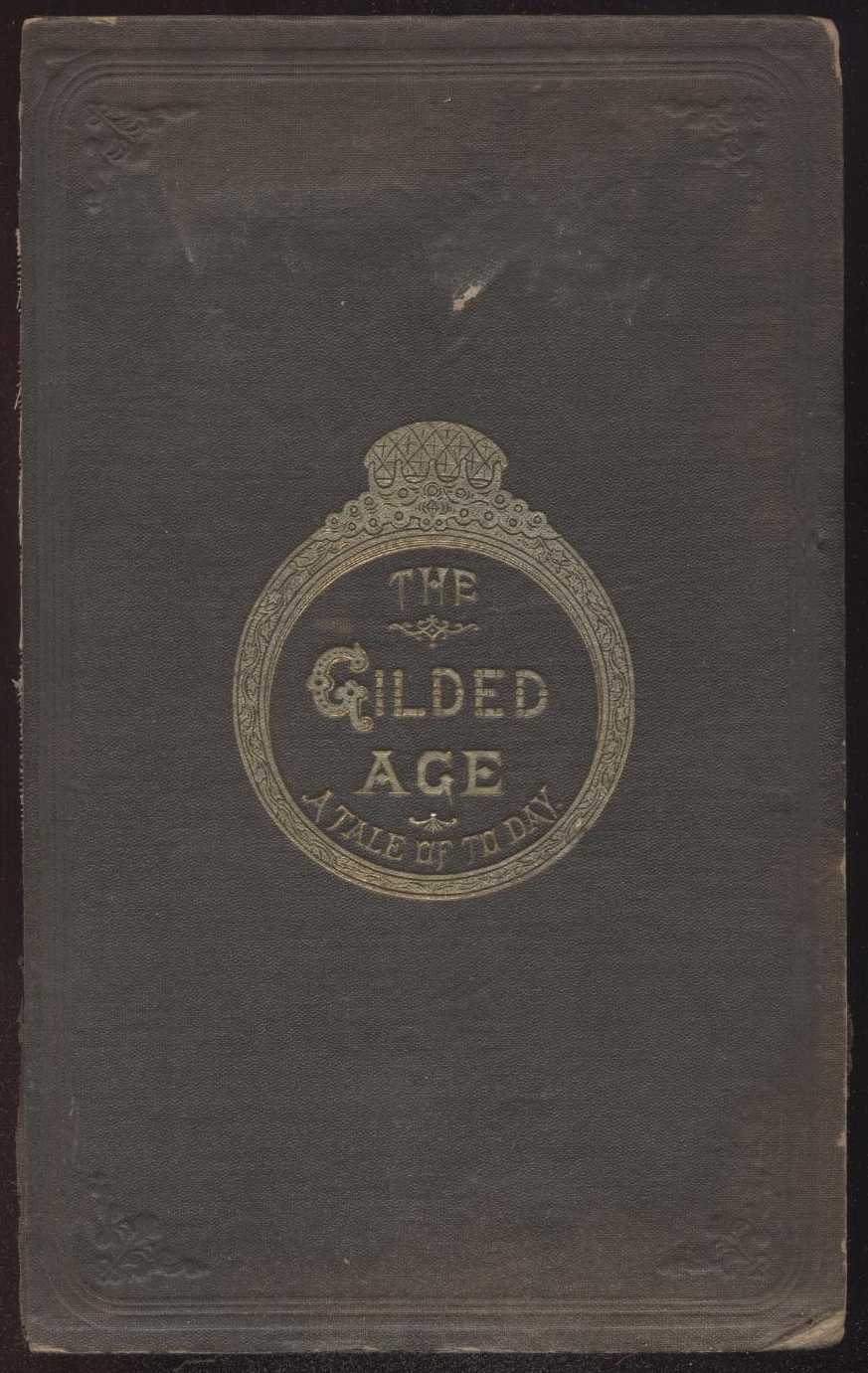
The Project Gutenberg EBook of The Gilded Age, Part 3. by Mark Twain (Samuel Clemens) and Charles Dudley Warner This eBook is for the use of anyone anywhere at no cost and with almost no restrictions whatsoever. You may copy it, give it away or re-use it under the terms of the Project Gutenberg License included with this eBook or online at www.gutenberg.org Title: The Gilded Age, Part 3. Author: Mark Twain (Samuel Clemens) and Charles Dudley Warner Release Date: June 20, 2004 [EBook #5820] Language: English Character set encoding: ISO-8859-1 *** START OF THIS PROJECT GUTENBERG EBOOK THE GILDED AGE, PART 3. *** Produced by David Widger

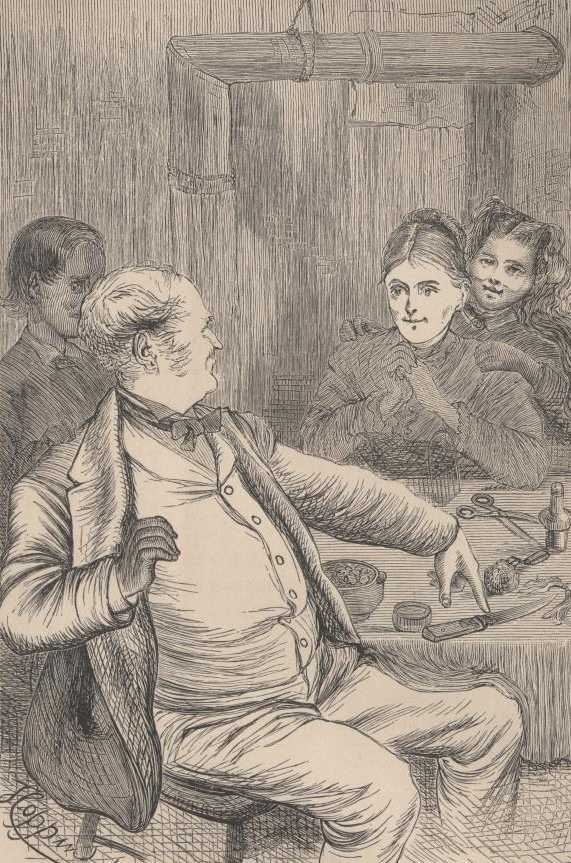
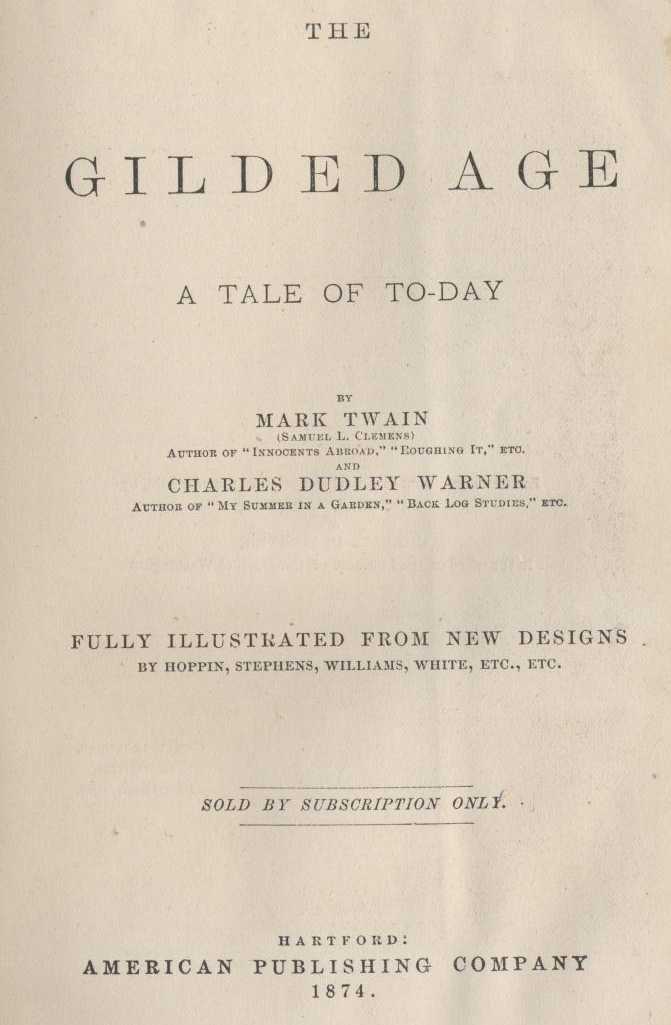
CHAPTER XIX
Harry Brierly Infatuated With Laura and Proposes She Visit Washington
CHAPTER XX
Senator Abner Dilwortliy Visits Hawkeye—Addresses the People and Makes the Acquaintance of Laura 186
CHAPTER XXI
Ruth Bolton at Fallkill Seminary—The Montagues—Ruth Becomes Quite Gay—Alice Montague
CHAPTER XXII
Philip and Harry Visit Fallkill—Harry Does the Agreeable to Ruth
CHAPTER XXIII
Harry at Washington Lobbying For An Appropriation For Stone's Landing —Philip in New York Studying Engineering
CHAPTER XXIV
Washington and Its Sights—The Appropriation Bill Reported From the Committee and Passed
CHAPTER XXV
Energetic Movements at Stone's Landing—Everything Booming—A Grand Smash Up
CHAPTER XXVI
The Boltons—Ruth at Home—Visitors and Speculations
CHAPTER XXVII
Col Sellers Comforts His Wife With His Views on the Prospects
Mr. Harry Brierly drew his pay as an engineer while he was living at the City Hotel in Hawkeye. Mr. Thompson had been kind enough to say that it didn't make any difference whether he was with the corps or not; and although Harry protested to the Colonel daily and to Washington Hawkins that he must go back at once to the line and superintend the lay-out with reference to his contract, yet he did not go, but wrote instead long letters to Philip, instructing him to keep his eye out, and to let him know when any difficulty occurred that required his presence.
Meantime Harry blossomed out in the society of Hawkeye, as he did in any society where fortune cast him and he had the slightest opportunity to expand. Indeed the talents of a rich and accomplished young fellow like Harry were not likely to go unappreciated in such a place. A land operator, engaged in vast speculations, a favorite in the select circles of New York, in correspondence with brokers and bankers, intimate with public men at Washington, one who could play the guitar and touch the banjo lightly, and who had an eye for a pretty girl, and knew the language of flattery, was welcome everywhere in Hawkeye. Even Miss Laura Hawkins thought it worth while to use her fascinations upon him, and to endeavor to entangle the volatile fellow in the meshes of her attractions.
"Gad," says Harry to the Colonel, "she's a superb creature, she'd make a stir in New York, money or no money. There are men I know would give her a railroad or an opera house, or whatever she wanted—at least they'd promise."
Harry had a way of looking at women as he looked at anything else in the world he wanted, and he half resolved to appropriate Miss Laura, during his stay in Hawkeye. Perhaps the Colonel divined his thoughts, or was offended at Harry's talk, for he replied,
"No nonsense, Mr. Brierly. Nonsense won't do in Hawkeye, not with my friends. The Hawkins' blood is good blood, all the way from Tennessee. The Hawkinses are under the weather now, but their Tennessee property is millions when it comes into market."
"Of course, Colonel. Not the least offense intended. But you can see she is a fascinating woman. I was only thinking, as to this appropriation, now, what such a woman could do in Washington. All correct, too, all correct. Common thing, I assure you in Washington; the wives of senators, representatives, cabinet officers, all sorts of wives, and some who are not wives, use their influence. You want an appointment? Do you go to Senator X? Not much. You get on the right side of his wife. Is it an appropriation? You'd go 'straight to the Committee, or to the Interior office, I suppose? You'd learn better than that. It takes a woman to get any thing through the Land Office: I tell you, Miss Laura would fascinate an appropriation right through the Senate and the House of Representatives in one session, if she was in Washington, as your friend, Colonel, of course as your friend."
"Would you have her sign our petition?" asked the Colonel, innocently.
Harry laughed. "Women don't get anything by petitioning Congress; nobody does, that's for form. Petitions are referred somewhere, and that's the last of them; you can't refer a handsome woman so easily, when she is present. They prefer 'em mostly."
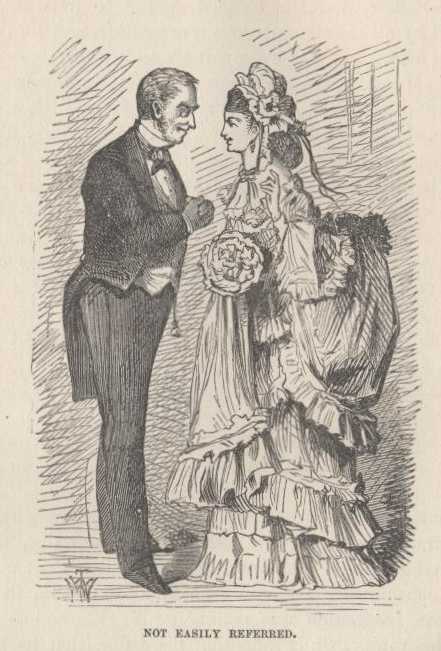
The petition however was elaborately drawn up, with a glowing description of Napoleon and the adjacent country, and a statement of the absolute necessity to the prosperity of that region and of one of the stations on the great through route to the Pacific, of the, immediate improvement of Columbus River; to this was appended a map of the city and a survey of the river. It was signed by all the people at Stone's Landing who could write their names, by Col. Beriah Sellers, and the Colonel agreed to have the names headed by all the senators and representatives from the state and by a sprinkling of ex-governors and ex-members of congress. When completed it was a formidable document. Its preparation and that of more minute plots of the new city consumed the valuable time of Sellers and Harry for many weeks, and served to keep them both in the highest spirits.
In the eyes of Washington Hawkins, Harry was a superior being, a man who was able to bring things to pass in a way that excited his enthusiasm. He never tired of listening to his stories of what he had done and of what he was going to do. As for Washington, Harry thought he was a man of ability and comprehension, but "too visionary," he told the Colonel. The Colonel said he might be right, but he had never noticed anything visionary about him.
"He's got his plans, sir. God bless my soul, at his age, I was full of plans. But experience sobers a man, I never touch any thing now that hasn't been weighed in my judgment; and when Beriah Sellers puts his judgment on a thing, there it is."
Whatever might have been Harry's intentions with regard to Laura, he saw more and more of her every day, until he got to be restless and nervous when he was not with her.
That consummate artist in passion allowed him to believe that the fascination was mainly on his side, and so worked upon his vanity, while inflaming his ardor, that he scarcely knew what he was about. Her coolness and coyness were even made to appear the simple precautions of a modest timidity, and attracted him even more than the little tendernesses into which she was occasionally surprised. He could never be away from her long, day or evening; and in a short time their intimacy was the town talk. She played with him so adroitly that Harry thought she was absorbed in love for him, and yet he was amazed that he did not get on faster in his conquest.
And when he thought of it, he was piqued as well. A country girl, poor enough, that was evident; living with her family in a cheap and most unattractive frame house, such as carpenters build in America, scantily furnished and unadorned; without the adventitious aids of dress or jewels or the fine manners of society—Harry couldn't understand it. But she fascinated him, and held him just beyond the line of absolute familiarity at the same time. While he was with her she made him forget that the Hawkins' house was nothing but a wooden tenement, with four small square rooms on the ground floor and a half story; it might have been a palace for aught he knew.
Perhaps Laura was older than Harry. She was, at any rate, at that ripe age when beauty in woman seems more solid than in the budding period of girlhood, and she had come to understand her powers perfectly, and to know exactly how much of the susceptibility and archness of the girl it was profitable to retain. She saw that many women, with the best intentions, make a mistake of carrying too much girlishness into womanhood. Such a woman would have attracted Harry at any time, but only a woman with a cool brain and exquisite art could have made him lose his head in this way; for Harry thought himself a man of the world. The young fellow never dreamed that he was merely being experimented on; he was to her a man of another society and another culture, different from that she had any knowledge of except in books, and she was not unwilling to try on him the fascinations of her mind and person.
For Laura had her dreams. She detested the narrow limits in which her lot was cast, she hated poverty. Much of her reading had been of modern works of fiction, written by her own sex, which had revealed to her something of her own powers and given her indeed, an exaggerated notion of the influence, the wealth, the position a woman may attain who has beauty and talent and ambition and a little culture, and is not too scrupulous in the use of them. She wanted to be rich, she wanted luxury, she wanted men at her feet, her slaves, and she had not—thanks to some of the novels she had read—the nicest discrimination between notoriety and reputation; perhaps she did not know how fatal notoriety usually is to the bloom of womanhood.
With the other Hawkins children Laura had been brought up in the belief that they had inherited a fortune in the Tennessee Lands. She did not by any means share all the delusion of the family; but her brain was not seldom busy with schemes about it. Washington seemed to her only to dream of it and to be willing to wait for its riches to fall upon him in a golden shower; but she was impatient, and wished she were a man to take hold of the business.
"You men must enjoy your schemes and your activity and liberty to go about the world," she said to Harry one day, when he had been talking of New York and Washington and his incessant engagements.
"Oh, yes," replied that martyr to business, "it's all well enough, if you don't have too much of it, but it only has one object."
"What is that?"
"If a woman doesn't know, it's useless to tell her. What do you suppose I am staying in Hawkeye for, week after week, when I ought to be with my corps?"
"I suppose it's your business with Col. Sellers about Napoleon, you've always told me so," answered Laura, with a look intended to contradict her words.
"And now I tell you that is all arranged, I suppose you'll tell me I ought to go?"
"Harry!" exclaimed Laura, touching his arm and letting her pretty hand rest there a moment. "Why should I want you to go away? The only person in Hawkeye who understands me."
"But you refuse to understand me," replied Harry, flattered but still petulant. "You are like an iceberg, when we are alone."
Laura looked up with wonder in her great eyes, and something like a blush suffusing her face, followed by a look of langour that penetrated Harry's heart as if it had been longing.
"Did I ever show any want of confidence in you, Harry?" And she gave him her hand, which Harry pressed with effusion—something in her manner told him that he must be content with that favor.
It was always so. She excited his hopes and denied him, inflamed his passion and restrained it, and wound him in her toils day by day. To what purpose? It was keen delight to Laura to prove that she had power over men.
Laura liked to hear about life at the east, and especially about the luxurious society in which Mr. Brierly moved when he was at home. It pleased her imagination to fancy herself a queen in it.
"You should be a winter in Washington," Harry said.
"But I have no acquaintances there."
"Don't know any of the families of the congressmen? They like to have a pretty woman staying with them."
"Not one."
"Suppose Col. Sellers should, have business there; say, about this Columbus River appropriation?"
"Sellers!" and Laura laughed.
"You needn't laugh. Queerer things have happened. Sellers knows everybody from Missouri, and from the West, too, for that matter. He'd introduce you to Washington life quick enough. It doesn't need a crowbar to break your way into society there as it does in Philadelphia. It's democratic, Washington is. Money or beauty will open any door. If I were a handsome woman, I shouldn't want any better place than the capital to pick up a prince or a fortune."
"Thank you," replied Laura. "But I prefer the quiet of home, and the love of those I know;" and her face wore a look of sweet contentment and unworldliness that finished Mr. Harry Brierly for the day.
Nevertheless, the hint that Harry had dropped fell upon good ground, and bore fruit an hundred fold; it worked in her mind until she had built up a plan on it, and almost a career for herself. Why not, she said, why shouldn't I do as other women have done? She took the first opportunity to see Col. Sellers, and to sound him about the Washington visit. How was he getting on with his navigation scheme, would it be likely to take him from home to Jefferson City; or to Washington, perhaps?
"Well, maybe. If the people of Napoleon want me to go to Washington, and look after that matter, I might tear myself from my home. It's been suggested to me, but—not a word of it to Mrs. Sellers and the children. Maybe they wouldn't like to think of their father in Washington. But Dilworthy, Senator Dilworthy, says to me, 'Colonel, you are the man, you could influence more votes than any one else on such a measure, an old settler, a man of the people, you know the wants of Missouri; you've a respect for religion too, says he, and know how the cause of the gospel goes with improvements: Which is true enough, Miss Laura, and hasn't been enough thought of in connection with Napoleon. He's an able man, Dilworthy, and a good man. A man has got to be good to succeed as he has. He's only been in Congress a few years, and he must be worth a million. First thing in the morning when he stayed with me he asked about family prayers, whether we had 'em before or after breakfast. I hated to disappoint the Senator, but I had to out with it, tell him we didn't have 'em, not steady. He said he understood, business interruptions and all that, some men were well enough without, but as for him he never neglected the ordinances of religion. He doubted if the Columbus River appropriation would succeed if we did not invoke the Divine Blessing on it."
Perhaps it is unnecessary to say to the reader that Senator Dilworthy had not stayed with Col. Sellers while he was in Hawkeye; this visit to his house being only one of the Colonel's hallucinations—one of those instant creations of his fertile fancy, which were always flashing into his brain and out of his mouth in the course of any conversation and without interrupting the flow of it.
During the summer Philip rode across the country and made a short visit in Hawkeye, giving Harry an opportunity to show him the progress that he and the Colonel had made in their operation at Stone's Landing, to introduce him also to Laura, and to borrow a little money when he departed. Harry bragged about his conquest, as was his habit, and took Philip round to see his western prize.
Laura received Mr. Philip with a courtesy and a slight hauteur that rather surprised and not a little interested him. He saw at once that she was older than Harry, and soon made up his mind that she was leading his friend a country dance to which he was unaccustomed. At least he thought he saw that, and half hinted as much to Harry, who flared up at once; but on a second visit Philip was not so sure, the young lady was certainly kind and friendly and almost confiding with Harry, and treated Philip with the greatest consideration. She deferred to his opinions, and listened attentively when he talked, and in time met his frank manner with an equal frankness, so that he was quite convinced that whatever she might feel towards Harry, she was sincere with him. Perhaps his manly way did win her liking. Perhaps in her mind, she compared him with Harry, and recognized in him a man to whom a woman might give her whole soul, recklessly and with little care if she lost it. Philip was not invincible to her beauty nor to the intellectual charm of her presence.
The week seemed very short that he passed in Hawkeye, and when he bade Laura good by, he seemed to have known her a year.
"We shall see you again, Mr. Sterling," she said as she gave him her hand, with just a shade of sadness in her handsome eyes.
And when he turned away she followed him with a look that might have disturbed his serenity, if he had not at the moment had a little square letter in his breast pocket, dated at Philadelphia, and signed "Ruth."
The visit of Senator Abner Dilworthy was an event in Hawkeye. When a Senator, whose place is in Washington moving among the Great and guiding the destinies of the nation, condescends to mingle among the people and accept the hospitalities of such a place as Hawkeye, the honor is not considered a light one. All, parties are flattered by it and politics are forgotten in the presence of one so distinguished among his fellows.
Senator Dilworthy, who was from a neighboring state, had been a Unionist in the darkest days of his country, and had thriven by it, but was that any reason why Col. Sellers, who had been a confederate and had not thriven by it, should give him the cold shoulder?
The Senator was the guest of his old friend Gen. Boswell, but it almost appeared that he was indebted to Col. Sellers for the unreserved hospitalities of the town. It was the large hearted Colonel who, in a manner, gave him the freedom of the city.
"You are known here, sir," said the Colonel, "and Hawkeye is proud of you. You will find every door open, and a welcome at every hearthstone. I should insist upon your going to my house, if you were not claimed by your older friend Gen. Boswell. But you will mingle with our people, and you will see here developments that will surprise you."
The Colonel was so profuse in his hospitality that he must have made the impression upon himself that he had entertained the Senator at his own mansion during his stay; at any rate, he afterwards always spoke of him as his guest, and not seldom referred to the Senator's relish of certain viands on his table. He did, in fact, press him to dine upon the morning of the day the Senator was going away.
Senator Dilworthy was large and portly, though not tall—a pleasant spoken man, a popular man with the people.
He took a lively interest in the town and all the surrounding country, and made many inquiries as to the progress of agriculture, of education, and of religion, and especially as to the condition of the emancipated race.
"Providence," he said, "has placed them in our hands, and although you and I, General, might have chosen a different destiny for them, under the Constitution, yet Providence knows best."
"You can't do much with 'em," interrupted Col. Sellers. "They are a speculating race, sir, disinclined to work for white folks without security, planning how to live by only working for themselves. Idle, sir, there's my garden just a ruin of weeds. Nothing practical in 'em."
"There is some truth in your observation, Colonel, but you must educate them."
"You educate the niggro and you make him more speculating than he was before. If he won't stick to any industry except for himself now, what will he do then?"
"But, Colonel, the negro when educated will be more able to make his speculations fruitful."
"Never, sir, never. He would only have a wider scope to injure himself. A niggro has no grasp, sir. Now, a white man can conceive great operations, and carry them out; a niggro can't."
"Still," replied the Senator, "granting that he might injure himself in a worldly point of view, his elevation through education would multiply his chances for the hereafter—which is the important thing after all, Colonel. And no matter what the result is, we must fulfill our duty by this being."
"I'd elevate his soul," promptly responded the Colonel; "that's just it; you can't make his soul too immortal, but I wouldn't touch him, himself. Yes, sir! make his soul immortal, but don't disturb the niggro as he is."
Of course one of the entertainments offered the Senator was a public reception, held in the court house, at which he made a speech to his fellow citizens. Col. Sellers was master of ceremonies. He escorted the band from the city hotel to Gen. Boswell's; he marshalled the procession of Masons, of Odd Fellows, and of Firemen, the Good Templars, the Sons of Temperance, the Cadets of Temperance, the Daughters of Rebecca, the Sunday School children, and citizens generally, which followed the Senator to the court house; he bustled about the room long after every one else was seated, and loudly cried "Order!" in the dead silence which preceded the introduction of the Senator by Gen. Boswell. The occasion was one to call out his finest powers of personal appearance, and one he long dwelt on with pleasure.
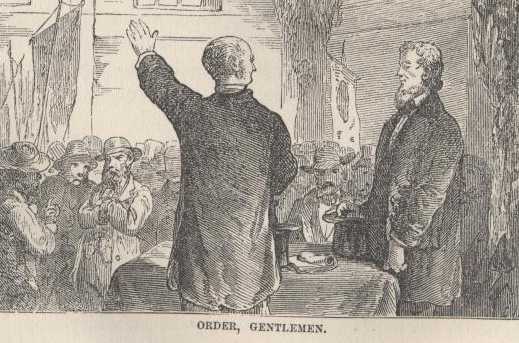
This not being an edition of the Congressional Globe it is impossible to give Senator Dilworthy's speech in full. He began somewhat as follows:
"Fellow citizens: It gives me great pleasure to thus meet and mingle with you, to lay aside for a moment the heavy duties of an official and burdensome station, and confer in familiar converse with my friends in your great state. The good opinion of my fellow citizens of all sections is the sweetest solace in all my anxieties. I look forward with longing to the time when I can lay aside the cares of office—" ["dam sight," shouted a tipsy fellow near the door. Cries of "put him out."]
"My friends, do not remove him. Let the misguided man stay. I see that he is a victim of that evil which is swallowing up public virtue and sapping the foundation of society. As I was saying, when I can lay down the cares of office and retire to the sweets of private life in some such sweet, peaceful, intelligent, wide-awake and patriotic place as Hawkeye (applause). I have traveled much, I have seen all parts of our glorious union, but I have never seen a lovelier village than yours, or one that has more signs of commercial and industrial and religious prosperity—(more applause)."
The Senator then launched into a sketch of our great country, and dwelt for an hour or more upon its prosperity and the dangers which threatened it.
He then touched reverently upon the institutions of religion, and upon the necessity of private purity, if we were to have any public morality. "I trust," he said, "that there are children within the sound of my voice," and after some remarks to them, the Senator closed with an apostrophe to "the genius of American Liberty, walking with the Sunday School in one hand and Temperance in the other up the glorified steps of the National Capitol."
Col. Sellers did not of course lose the opportunity to impress upon so influential a person as the Senator the desirability of improving the navigation of Columbus river. He and Mr. Brierly took the Senator over to Napoleon and opened to him their plan. It was a plan that the Senator could understand without a great deal of explanation, for he seemed to be familiar with the like improvements elsewhere. When, however, they reached Stone's Landing the Senator looked about him and inquired,
"Is this Napoleon?"
"This is the nucleus, the nucleus," said the Colonel, unrolling his map. "Here is the deepo, the church, the City Hall and so on."
"Ah, I see. How far from here is Columbus River? Does that stream empty——"
"That, why, that's Goose Run. Thar ain't no Columbus, thout'n it's over to Hawkeye," interrupted one of the citizens, who had come out to stare at the strangers. "A railroad come here last summer, but it haint been here no mo'."
"Yes, sir," the Colonel hastened to explain, "in the old records Columbus River is called Goose Run. You see how it sweeps round the town-forty-nine miles to the Missouri; sloop navigation all the way pretty much, drains this whole country; when it's improved steamboats will run right up here. It's got to be enlarged, deepened. You see by the map. Columbus River. This country must have water communication!"
"You'll want a considerable appropriation, Col. Sellers.
"I should say a million; is that your figure Mr. Brierly."
"According to our surveys," said Harry, "a million would do it; a million spent on the river would make Napoleon worth two millions at least."
"I see," nodded the Senator. "But you'd better begin by asking only for two or three hundred thousand, the usual way. You can begin to sell town lots on that appropriation you know."
The Senator, himself, to do him justice, was not very much interested in the country or the stream, but he favored the appropriation, and he gave the Colonel and Mr. Brierly to and understand that he would endeavor to get it through. Harry, who thought he was shrewd and understood Washington, suggested an interest.
But he saw that the Senator was wounded by the suggestion.
"You will offend me by repeating such an observation," he said. "Whatever I do will be for the public interest. It will require a portion of the appropriation for necessary expenses, and I am sorry to say that there are members who will have to be seen. But you can reckon upon my humble services."
This aspect of the subject was not again alluded to. The Senator possessed himself of the facts, not from his observation of the ground, but from the lips of Col. Sellers, and laid the appropriation scheme away among his other plans for benefiting the public.
It was on this visit also that the Senator made the acquaintance of Mr. Washington Hawkins, and was greatly taken with his innocence, his guileless manner and perhaps with his ready adaptability to enter upon any plan proposed.
Col. Sellers was pleased to see this interest that Washington had awakened, especially since it was likely to further his expectations with regard to the Tennessee lands; the Senator having remarked to the Colonel, that he delighted to help any deserving young man, when the promotion of a private advantage could at the same time be made to contribute to the general good. And he did not doubt that this was an opportunity of that kind.
The result of several conferences with Washington was that the Senator proposed that he should go to Washington with him and become his private secretary and the secretary of his committee; a proposal which was eagerly accepted.
The Senator spent Sunday in Hawkeye and attended church. He cheered the heart of the worthy and zealous minister by an expression of his sympathy in his labors, and by many inquiries in regard to the religious state of the region. It was not a very promising state, and the good man felt how much lighter his task would be, if he had the aid of such a man as Senator Dilworthy.
"I am glad to see, my dear sir," said the Senator, "that you give them the doctrines. It is owing to a neglect of the doctrines, that there is such a fearful falling away in the country. I wish that we might have you in Washington—as chaplain, now, in the senate."
The good man could not but be a little flattered, and if sometimes, thereafter, in his discouraging work, he allowed the thought that he might perhaps be called to Washington as chaplain of the Senate, to cheer him, who can wonder. The Senator's commendation at least did one service for him, it elevated him in the opinion of Hawkeye.
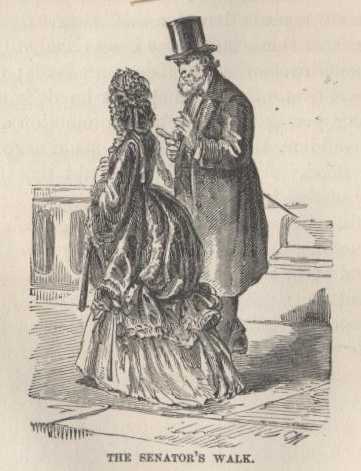
Laura was at church alone that day, and Mr. Brierly walked home with her. A part of their way lay with that of General Boswell and Senator Dilworthy, and introductions were made. Laura had her own reasons for wishing to know the Senator, and the Senator was not a man who could be called indifferent to charms such as hers. That meek young lady so commended herself to him in the short walk, that he announced his intentions of paying his respects to her the next day, an intention which Harry received glumly; and when the Senator was out of hearing he called him "an old fool."
"Fie," said Laura, "I do believe you are jealous, Harry. He is a very pleasant man. He said you were a young man of great promise."
The Senator did call next day, and the result of his visit was that he was confirmed in his impression that there was something about him very attractive to ladies. He saw Laura again and again daring his stay, and felt more and more the subtle influence of her feminine beauty, which every man felt who came near her.
Harry was beside himself with rage while the Senator remained in town; he declared that women were always ready to drop any man for higher game; and he attributed his own ill-luck to the Senator's appearance. The fellow was in fact crazy about her beauty and ready to beat his brains out in chagrin. Perhaps Laura enjoyed his torment, but she soothed him with blandishments that increased his ardor, and she smiled to herself to think that he had, with all his protestations of love, never spoken of marriage. Probably the vivacious fellow never had thought of it. At any rate when he at length went away from Hawkeye he was no nearer it. But there was no telling to what desperate lengths his passion might not carry him.
Laura bade him good bye with tender regret, which, however, did not disturb her peace or interfere with her plans. The visit of Senator Dilworthy had become of more importance to her, and it by and by bore the fruit she longed for, in an invitation to visit his family in the National Capital during the winter session of Congress.
O lift your natures up:
Embrace our aims: work out your freedom. Girls,
Knowledge is now no more a fountain sealed;
Drink deep until the habits of the slave,
The sins of emptiness, gossip and spite
And slander, die.
The Princess.
Whether medicine is a science, or only an empirical method of getting a living out of the ignorance of the human race, Ruth found before her first term was over at the medical school that there were other things she needed to know quite as much as that which is taught in medical books, and that she could never satisfy her aspirations without more general culture.
"Does your doctor know any thing—I don't mean about medicine, but about things in general, is he a man of information and good sense?" once asked an old practitioner. "If he doesn't know any thing but medicine the chance is he doesn't know that:"
The close application to her special study was beginning to tell upon Ruth's delicate health also, and the summer brought with it only weariness and indisposition for any mental effort.
In this condition of mind and body the quiet of her home and the unexciting companionship of those about her were more than ever tiresome.
She followed with more interest Philip's sparkling account of his life in the west, and longed for his experiences, and to know some of those people of a world so different from here, who alternately amused and displeased him. He at least was learning the world, the good and the bad of it, as must happen to every one who accomplishes anything in it.
But what, Ruth wrote, could a woman do, tied up by custom, and cast into particular circumstances out of which it was almost impossible to extricate herself? Philip thought that he would go some day and extricate Ruth, but he did not write that, for he had the instinct to know that this was not the extrication she dreamed of, and that she must find out by her own experience what her heart really wanted.
Philip was not a philosopher, to be sure, but he had the old fashioned notion, that whatever a woman's theories of life might be, she would come round to matrimony, only give her time. He could indeed recall to mind one woman—and he never knew a nobler—whose whole soul was devoted and who believed that her life was consecrated to a certain benevolent project in singleness of life, who yielded to the touch of matrimony, as an icicle yields to a sunbeam.
Neither at home nor elsewhere did Ruth utter any complaint, or admit any weariness or doubt of her ability to pursue the path she had marked out for herself. But her mother saw clearly enough her struggle with infirmity, and was not deceived by either her gaiety or by the cheerful composure which she carried into all the ordinary duties that fell to her. She saw plainly enough that Ruth needed an entire change of scene and of occupation, and perhaps she believed that such a change, with the knowledge of the world it would bring, would divert Ruth from a course for which she felt she was physically entirely unfitted.
It therefore suited the wishes of all concerned, when autumn came, that Ruth should go away to school. She selected a large New England Seminary, of which she had often heard Philip speak, which was attended by both sexes and offered almost collegiate advantages of education. Thither she went in September, and began for the second time in the year a life new to her.
The Seminary was the chief feature of Fallkill, a village of two to three thousand inhabitants. It was a prosperous school, with three hundred students, a large corps of teachers, men and women, and with a venerable rusty row of academic buildings on the shaded square of the town. The students lodged and boarded in private families in the place, and so it came about that while the school did a great deal to support the town, the town gave the students society and the sweet influences of home life. It is at least respectful to say that the influences of home life are sweet.
Ruth's home, by the intervention of Philip, was in a family—one of the
rare exceptions in life or in fiction—that had never known better days.
The Montagues, it is perhaps well to say, had intended to come over in
the Mayflower, but were detained at Delft Haven by the illness of a
child. They came over to Massachusetts Bay in another vessel, and thus
escaped the onus of that brevet nobility under which the successors of
the Mayflower Pilgrims have descended. Having no factitious weight of
dignity to carry, the Montagues steadily improved their condition from
the day they landed, and they were never more vigorous or prosperous than
at the date of this narrative. With character compacted by the rigid
Puritan discipline of more than two centuries, they had retained its
strength and purity and thrown off its narrowness, and were now
blossoming under the generous modern influences. Squire Oliver Montague,
a lawyer who had retired from the practice of his profession except in
rare cases, dwelt in a square old fashioned New England mansion a quarter of a mile away from
the green.
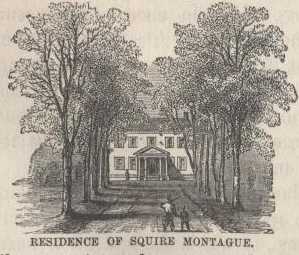
It was called a mansion because it stood alone with ample fields about it, and had an avenue of trees leading to it from the road, and on the west commanded a view of a pretty little lake with gentle slopes and nodding were now blossoming under the generous modern influences. Squire Oliver Montague, a lawyer who had retired from the practice of his profession except in rare cases, dwelt in a square old fashioned New England groves. But it was just a plain, roomy house, capable of extending to many guests an unpretending hospitality.
The family consisted of the Squire and his wife, a son and a daughter married and not at home, a son in college at Cambridge, another son at the Seminary, and a daughter Alice, who was a year or more older than Ruth. Having only riches enough to be able to gratify reasonable desires, and yet make their gratifications always a novelty and a pleasure, the family occupied that just mean in life which is so rarely attained, and still more rarely enjoyed without discontent.
If Ruth did not find so much luxury in the house as in her own home,
there were evidences of culture, of intellectual activity and of a zest
in the affairs of all the world, which greatly impressed her. Every room
had its book-cases or book-shelves, and was more or less a library; upon
every table was liable to be a litter of new books, fresh periodicals and
daily newspapers.
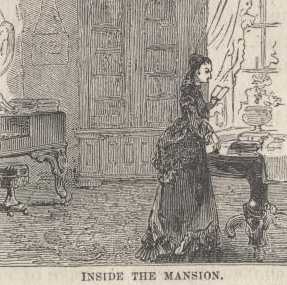
There were plants in the sunny windows and some choice engravings on the walls, with bits of color in oil or water-colors; the piano was sure to be open and strewn with music; and there were photographs and little souvenirs here and there of foreign travel. An absence of any "what-pots" in the corners with rows of cheerful shells, and Hindoo gods, and Chinese idols, and nests of use less boxes of lacquered wood, might be taken as denoting a languidness in the family concerning foreign missions, but perhaps unjustly.
At any rate the life of the world flowed freely into this hospitable house, and there was always so much talk there of the news of the day, of the new books and of authors, of Boston radicalism and New York civilization, and the virtue of Congress, that small gossip stood a very poor chance.
All this was in many ways so new to Ruth that she seemed to have passed into another world, in which she experienced a freedom and a mental exhilaration unknown to her before. Under this influence she entered upon her studies with keen enjoyment, finding for a time all the relaxation she needed, in the charming social life at the Montague house.
It is strange, she wrote to Philip, in one of her occasional letters, that you never told me more about this delightful family, and scarcely mentioned Alice who is the life of it, just the noblest girl, unselfish, knows how to do so many things, with lots of talent, with a dry humor, and an odd way of looking at things, and yet quiet and even serious often—one of your "capable" New England girls. We shall be great friends. It had never occurred to Philip that there was any thing extraordinary about the family that needed mention. He knew dozens of girls like Alice, he thought to himself, but only one like Ruth.
Good friends the two girls were from the beginning. Ruth was a study to Alice; the product of a culture entirely foreign to her experience, so much a child in some things, so much a woman in others; and Ruth in turn, it must be confessed, probing Alice sometimes with her serious grey eyes, wondered what her object in life was, and whether she had any purpose beyond living as she now saw her. For she could scarcely conceive of a life that should not be devoted to the accomplishment of some definite work, and she had-no doubt that in her own case everything else would yield to the professional career she had marked out.
"So you know Philip Sterling," said Ruth one day as the girls sat at their sewing. Ruth never embroidered, and never sewed when she could avoid it. Bless her.
"Oh yes, we are old friends. Philip used to come to Fallkill often while he was in college. He was once rusticated here for a term."
"Rusticated?"
"Suspended for some College scrape. He was a great favorite here. Father and he were famous friends. Father said that Philip had no end of nonsense in him and was always blundering into something, but he was a royal good fellow and would come out all right."
"Did you think he was fickle?"
"Why, I never thought whether he was or not," replied Alice looking up. "I suppose he was always in love with some girl or another, as college boys are. He used to make me his confidant now and then, and be terribly in the dumps."
"Why did he come to you?" pursued Ruth you were younger than he."
"I'm sure I don't know. He was at our house a good deal. Once at a picnic by the lake, at the risk of his own life, he saved sister Millie from drowning, and we all liked to have him here. Perhaps he thought as he had saved one sister, the other ought to help him when he was in trouble. I don't know."
The fact was that Alice was a person who invited confidences, because she never betrayed them, and gave abundant sympathy in return. There are persons, whom we all know, to whom human confidences, troubles and heart-aches flow as naturally its streams to a placid lake.
This is not a history of Fallkill, nor of the Montague family, worthy as both are of that honor, and this narrative cannot be diverted into long loitering with them. If the reader visits the village to-day, he will doubtless be pointed out the Montague dwelling, where Ruth lived, the cross-lots path she traversed to the Seminary, and the venerable chapel with its cracked bell.
In the little society of the place, the Quaker girl was a favorite, and no considerable social gathering or pleasure party was thought complete without her. There was something in this seemingly transparent and yet deep character, in her childlike gaiety and enjoyment of the society about her, and in her not seldom absorption in herself, that would have made her long remembered there if no events had subsequently occurred to recall her to mind.
To the surprise of Alice, Ruth took to the small gaieties of the village with a zest of enjoyment that seemed foreign to one who had devoted her life to a serious profession from the highest motives. Alice liked society well enough, she thought, but there was nothing exciting in that of Fallkill, nor anything novel in the attentions of the well-bred young gentlemen one met in it. It must have worn a different aspect to Ruth, for she entered into its pleasures at first with curiosity, and then with interest and finally with a kind of staid abandon that no one would have deemed possible for her. Parties, picnics, rowing-matches, moonlight strolls, nutting expeditions in the October woods,—Alice declared that it was a whirl of dissipation. The fondness of Ruth, which was scarcely disguised, for the company of agreeable young fellows, who talked nothings, gave Alice opportunity for no end of banter.
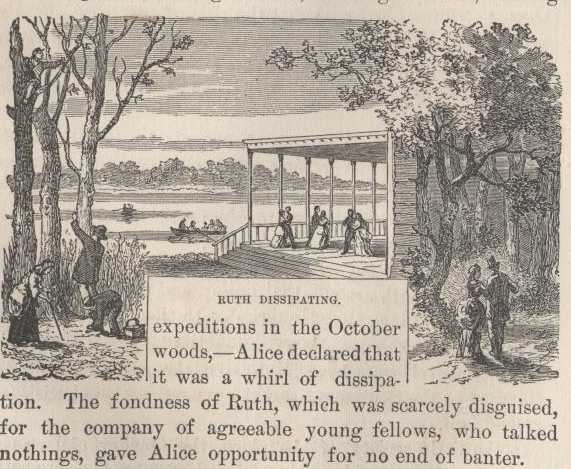
"Do you look upon them as I subjects, dear?" she would ask.
And Ruth laughed her merriest laugh, and then looked sober again. Perhaps she was thinking, after all, whether she knew herself.
If you should rear a duck in the heart of the Sahara, no doubt it would swim if you brought it to the Nile.
Surely no one would have predicted when Ruth left Philadelphia that she would become absorbed to this extent, and so happy, in a life so unlike that she thought she desired. But no one can tell how a woman will act under any circumstances. The reason novelists nearly always fail in depicting women when they make them act, is that they let them do what they have observed some woman has done at sometime or another. And that is where they make a mistake; for a woman will never do again what has been done before. It is this uncertainty that causes women, considered as materials for fiction, to be so interesting to themselves and to others.
As the fall went on and the winter, Ruth did not distinguish herself greatly at the Fallkill Seminary as a student, a fact that apparently gave her no anxiety, and did not diminish her enjoyment of a new sort of power which had awakened within her.
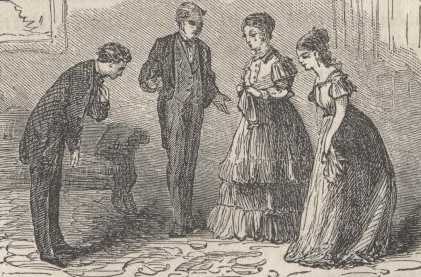
In mid-winter, an event occurred of unusual interest to the inhabitants of the Montague house, and to the friends of the young ladies who sought their society.
This was the arrival at the Sassacua Hotel of two young gentlemen from the west.
It is the fashion in New England to give Indian names to the public houses, not that the late lamented savage knew how to keep a hotel, but that his warlike name may impress the traveler who humbly craves shelter there, and make him grateful to the noble and gentlemanly clerk if he is allowed to depart with his scalp safe.
The two young gentlemen were neither students for the Fallkill Seminary, nor lecturers on physiology, nor yet life assurance solicitors, three suppositions that almost exhausted the guessing power of the people at the hotel in respect to the names of "Philip Sterling and Henry Brierly, Missouri," on the register. They were handsome enough fellows, that was evident, browned by out-door exposure, and with a free and lordly way about them that almost awed the hotel clerk himself. Indeed, he very soon set down Mr. Brierly as a gentleman of large fortune, with enormous interests on his shoulders. Harry had a way of casually mentioning western investments, through lines, the freighting business, and the route through the Indian territory to Lower California, which was calculated to give an importance to his lightest word.
"You've a pleasant town here, sir, and the most comfortable looking hotel I've seen out of New York," said Harry to the clerk; "we shall stay here a few days if you can give us a roomy suite of apartments."
Harry usually had the best of everything, wherever he went, as such fellows always do have in this accommodating world. Philip would have been quite content with less expensive quarters, but there was no resisting Harry's generosity in such matters.
Railroad surveying and real-estate operations were at a standstill during the winter in Missouri, and the young men had taken advantage of the lull to come east, Philip to see if there was any disposition in his friends, the railway contractors, to give him a share in the Salt Lick Union Pacific Extension, and Harry to open out to his uncle the prospects of the new city at Stone's Landing, and to procure congressional appropriations for the harbor and for making Goose Run navigable. Harry had with him a map of that noble stream and of the harbor, with a perfect net-work of railroads centering in it, pictures of wharves, crowded with steamboats, and of huge grain-elevators on the bank, all of which grew out of the combined imaginations of Col. Sellers and Mr. Brierly. The Colonel had entire confidence in Harry's influence with Wall street, and with congressmen, to bring about the consummation of their scheme, and he waited his return in the empty house at Hawkeye, feeding his pinched family upon the most gorgeous expectations with a reckless prodigality.
"Don't let 'em into the thing more than is necessary," says the Colonel to Harry; "give 'em a small interest; a lot apiece in the suburbs of the Landing ought to do a congressman, but I reckon you'll have to mortgage a part of the city itself to the brokers."
Harry did not find that eagerness to lend money on Stone's Landing in Wall street which Col. Sellers had expected, (it had seen too many such maps as he exhibited), although his uncle and some of the brokers looked with more favor on the appropriation for improving the navigation of Columbus River, and were not disinclined to form a company for that purpose. An appropriation was a tangible thing, if you could get hold of it, and it made little difference what it was appropriated for, so long as you got hold of it.
Pending these weighty negotiations, Philip has persuaded Harry to take a little run up to Fallkill, a not difficult task, for that young man would at any time have turned his back upon all the land in the West at sight of a new and pretty face, and he had, it must be confessed, a facility in love making which made it not at all an interference with the more serious business of life. He could not, to be sure, conceive how Philip could be interested in a young lady who was studying medicine, but he had no objection to going, for he did not doubt that there were other girls in Fallkill who were worth a week's attention.
The young men were received at the house of the Montagues with the hospitality which never failed there.
"We are glad to see you again," exclaimed the Squire heartily, "you are welcome Mr. Brierly, any friend of Phil's is welcome at our house"
"It's more like home to me, than any place except my own home," cried Philip, as he looked about the cheerful house and went through a general hand-shaking.
"It's a long time, though, since you have been here to say so," Alice said, with her father's frankness of manner; "and I suspect we owe the visit now to your sudden interest in the Fallkill Seminary."
Philip's color came, as it had an awkward way of doing in his tell-tale face, but before he could stammer a reply, Harry came in with,
"That accounts for Phil's wish to build a Seminary at Stone's Landing, our place in Missouri, when Col. Sellers insisted it should be a University. Phil appears to have a weakness for Seminaries."
"It would have been better for your friend Sellers," retorted Philip, "if he had had a weakness for district schools. Col. Sellers, Miss Alice, is a great friend of Harry's, who is always trying to build a house by beginning at the top."
"I suppose it's as easy to build a University on paper as a Seminary, and it looks better," was Harry's reflection; at which the Squire laughed, and said he quite agreed with him. The old gentleman understood Stone's Landing a good deal better than he would have done after an hour's talk with either of it's expectant proprietors.
At this moment, and while Philip was trying to frame a question that he found it exceedingly difficult to put into words, the door opened quietly, and Ruth entered. Taking in the, group with a quick glance, her eye lighted up, and with a merry smile she advanced and shook hands with Philip. She was so unconstrained and sincerely cordial, that it made that hero of the west feel somehow young, and very ill at ease.
For months and months he had thought of this meeting and pictured it to himself a hundred times, but he had never imagined it would be like this. He should meet Ruth unexpectedly, as she was walking alone from the school, perhaps, or entering the room where he was waiting for her, and she would cry "Oh! Phil," and then check herself, and perhaps blush, and Philip calm but eager and enthusiastic, would reassure her by his warm manner, and he would take her hand impressively, and she would look up timidly, and, after his' long absence, perhaps he would be permitted to Good heavens, how many times he had come to this point, and wondered if it could happen so. Well, well; he had never supposed that he should be the one embarrassed, and above all by a sincere and cordial welcome.
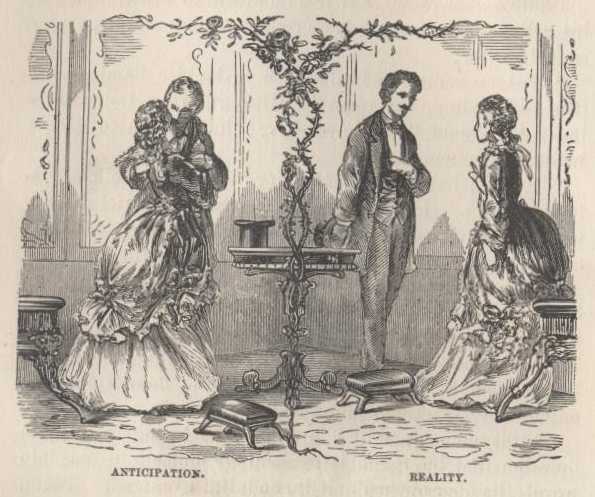
"We heard you were at the Sassacus House," were Ruth's first words; "and this I suppose is your friend?"
"I beg your pardon," Philip at length blundered out, "this is Mr. Brierly of whom I have written you."
And Ruth welcomed Harry with a friendliness that Philip thought was due to his friend, to be sure, but which seemed to him too level with her reception of himself, but which Harry received as his due from the other sex.
Questions were asked about the journey and about the West, and the conversation became a general one, until Philip at length found himself talking with the Squire in relation to land and railroads and things he couldn't keep his mind on especially as he heard Ruth and Harry in an animated discourse, and caught the words "New York," and "opera," and "reception," and knew that Harry was giving his imagination full range in the world of fashion.
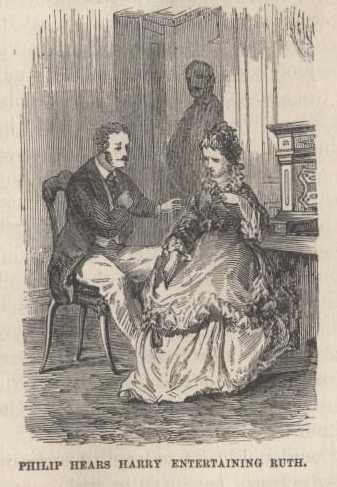
Harry knew all about the opera, green room and all (at least he said so) and knew a good many of the operas and could make very entertaining stories of their plots, telling how the soprano came in here, and the basso here, humming the beginning of their airs—tum-ti-tum-ti-ti—suggesting the profound dissatisfaction of the basso recitative—down-among-the-dead-men—and touching off the whole with an airy grace quite captivating; though he couldn't have sung a single air through to save himself, and he hadn't an ear to know whether it was sung correctly. All the same he doted on the opera, and kept a box there, into which he lounged occasionally to hear a favorite scene and meet his society friends.
If Ruth was ever in the city he should be happy to place his box at the disposal of Ruth and her friends. Needless to say that she was delighted with the offer.
When she told Philip of it, that discreet young fellow only smiled, and said that he hoped she would be fortunate enough to be in New York some evening when Harry had not already given the use of his private box to some other friend.
The Squire pressed the visitors to let him send for their trunks and urged them to stay at his house, and Alice joined in the invitation, but Philip had reasons for declining. They staid to supper, however, and in; the evening Philip had a long talk apart with Ruth, a delightful hour to him, in which she spoke freely of herself as of old, of her studies at Philadelphia and of her plans, and she entered into his adventures and prospects in the West with a genuine and almost sisterly interest; an interest, however, which did not exactly satisfy Philip—it was too general and not personal enough to suit him. And with all her freedom in speaking of her own hopes, Philip could not, detect any reference to himself in them; whereas he never undertook anything that he did not think of Ruth in connection with it, he never made a plan that had not reference to her, and he never thought of anything as complete if she could not share it. Fortune, reputation these had no value to him except in Ruth's eyes, and there were times when it seemed to him that if Ruth was not on this earth, he should plunge off into some remote wilderness and live in a purposeless seclusion.
"I hoped," said Philip; "to get a little start in connection with this new railroad, and make a little money, so that I could came east and engage in something more suited to my tastes. I shouldn't like to live in the West. Would you?
"It never occurred to me whether I would or not," was the unembarrassed reply. "One of our graduates went to Chicago, and has a nice practice there. I don't know where I shall go. It would mortify mother dreadfully to have me driving about Philadelphia in a doctor's gig."
Philip laughed at the idea of it. "And does it seem as necessary to you to do it as it did before you came to Fallkill?"
It was a home question, and went deeper than Philip knew, for Ruth at once thought of practicing her profession among the young gentlemen and ladies of her acquaintance in the village; but she was reluctant to admit to herself that her notions of a career had undergone any change.
"Oh, I don't think I should come to Fallkill to practice, but I must do something when I am through school; and why not medicine?"
Philip would like to have explained why not, but the explanation would be of no use if it were not already obvious to Ruth.
Harry was equally in his element whether instructing Squire Montague about the investment of capital in Missouri, the improvement of Columbus River, the project he and some gentlemen in New York had for making a shorter Pacific connection with the Mississippi than the present one; or diverting Mrs. Montague with his experience in cooking in camp; or drawing for Miss Alice an amusing picture of the social contrasts of New England and the border where he had been. Harry was a very entertaining fellow, having his imagination to help his memory, and telling his stories as if he believed them—as perhaps he did. Alice was greatly amused with Harry and listened so seriously to his romancing that he exceeded his usual limits. Chance allusions to his bachelor establishment in town and the place of his family on the Hudson, could not have been made by a millionaire, more naturally.
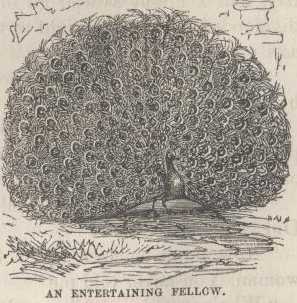
"I should think," queried Alice, "you would rather stay in New York than to try the rough life at the West you have been speaking of."
"Oh, adventure," says Harry, "I get tired of New York. And besides I got involved in some operations that I had to see through. Parties in New York only last week wanted me to go down into Arizona in a big diamond interest. I told them, no, no speculation for me. I've got my interests in Missouri; and I wouldn't leave Philip, as long as he stays there."
When the young gentlemen were on their way back to the hotel, Mr. Philip, who was not in very good humor, broke out,
"What the deuce, Harry, did you go on in that style to the Montagues for?"
"Go on?" cried Harry. "Why shouldn't I try to make a pleasant evening? And besides, ain't I going to do those things? What difference does it make about the mood and tense of a mere verb? Didn't uncle tell me only last Saturday, that I might as well go down to Arizona and hunt for diamonds? A fellow might as well make a good impression as a poor one."
"Nonsense. You'll get to believing your own romancing by and by."
"Well, you'll see. When Sellers and I get that appropriation, I'll show you an establishment in town and another on the Hudson and a box at the opera."
"Yes, it will be like Col. Sellers' plantation at Hawkeye. Did you ever see that?"
"Now, don't be cross, Phil. She's just superb, that little woman. You never told me."
"Who's just superb?" growled Philip, fancying this turn of the conversation less than the other.
"Well, Mrs. Montague, if you must know." And Harry stopped to light a cigar, and then puffed on in silence. The little quarrel didn't last over night, for Harry never appeared to cherish any ill-will half a second, and Philip was too sensible to continue a row about nothing; and he had invited Harry to come with him.
The young gentlemen stayed in Fallkill a week, and were every day at the Montagues, and took part in the winter gaieties of the village. There were parties here and there to which the friends of Ruth and the Montagues were of course invited, and Harry in the generosity of his nature, gave in return a little supper at the hotel, very simple indeed, with dancing in the hall, and some refreshments passed round. And Philip found the whole thing in the bill when he came to pay it.
Before the week was over Philip thought he had a new light on the character of Ruth. Her absorption in the small gaieties of the society there surprised him. He had few opportunities for serious conversation with her. There was always some butterfly or another flitting about, and when Philip showed by his manner that he was not pleased, Ruth laughed merrily enough and rallied him on his soberness—she declared he was getting to be grim and unsocial. He talked indeed more with Alice than with Ruth, and scarcely concealed from her the trouble that was in his mind. It needed, in fact, no word from him, for she saw clearly enough what was going forward, and knew her sex well enough to know there was no remedy for it but time.
"Ruth is a dear girl, Philip, and has as much firmness of purpose as ever, but don't you see she has just discovered that she is fond of society? Don't you let her see you are selfish about it, is my advice."
The last evening they were to spend in Fallkill, they were at the Montagues, and Philip hoped that he would find Ruth in a different mood. But she was never more gay, and there was a spice of mischief in her eye and in her laugh. "Confound it," said Philip to himself, "she's in a perfect twitter."
He would have liked to quarrel with her, and fling himself out of the house in tragedy style, going perhaps so far as to blindly wander off miles into the country and bathe his throbbing brow in the chilling rain of the stars, as people do in novels; but he had no opportunity. For Ruth was as serenely unconscious of mischief as women can be at times, and fascinated him more than ever with her little demurenesses and half-confidences. She even said "Thee" to him once in reproach for a cutting speech he began. And the sweet little word made his heart beat like a trip-hammer, for never in all her life had she said "thee" to him before.
Was she fascinated with Harry's careless 'bon homie' and gay assurance? Both chatted away in high spirits, and made the evening whirl along in the most mirthful manner. Ruth sang for Harry, and that young gentleman turned the leaves for her at the piano, and put in a bass note now and then where he thought it would tell.
Yes, it was a merry evening, and Philip was heartily glad when it was over, and the long leave-taking with the family was through with.
"Farewell Philip. Good night Mr. Brierly," Ruth's clear voice sounded after them as they went down the walk.
And she spoke Harry's name last, thought Philip.
"O see ye not yon narrow road
So thick beset wi' thorns and briers?
That is the Path of Righteousness,
Though after it but few inquires.
"And see ye not yon braid, braid road,
That lies across the lily leven?
That is the Path of Wickedness,
Though some call it the road to Heaven."
Thomas the Rhymer.
Phillip and Harry reached New York in very different states of mind. Harry was buoyant. He found a letter from Col. Sellers urging him to go to Washington and confer with Senator Dilworthy. The petition was in his hands.
It had been signed by everybody of any importance in Missouri, and would be presented immediately.
"I should go on myself," wrote the Colonel, "but I am engaged in the invention of a process for lighting such a city as St. Louis by means of water; just attach my machine to the water-pipes anywhere and the decomposition of the fluid begins, and you will have floods of light for the mere cost of the machine. I've nearly got the lighting part, but I want to attach to it a heating, cooking, washing and ironing apparatus. It's going to be the great thing, but we'd better keep this appropriation going while I am perfecting it."
Harry took letters to several congressmen from his uncle and from Mr. Duff Brown, each of whom had an extensive acquaintance in both houses where they were well known as men engaged in large private operations for the public good and men, besides, who, in the slang of the day, understood the virtues of "addition, division and silence."
Senator Dilworthy introduced the petition into the Senate with the remark that he knew, personally, the signers of it, that they were men interested; it was true, in the improvement of the country, but he believed without any selfish motive, and that so far as he knew the signers were loyal. It pleased him to see upon the roll the names of many colored citizens, and it must rejoice every friend of humanity to know that this lately emancipated race were intelligently taking part in the development of the resources of their native land. He moved the reference of the petition to the proper committee.
Senator Dilworthy introduced his young friend to influential members, as a person who was very well informed about the Salt Lick Extension of the Pacific, and was one of the Engineers who had made a careful survey of Columbus River; and left him to exhibit his maps and plans and to show the connection between the public treasury, the city of Napoleon and legislation for the benefit off the whole country.
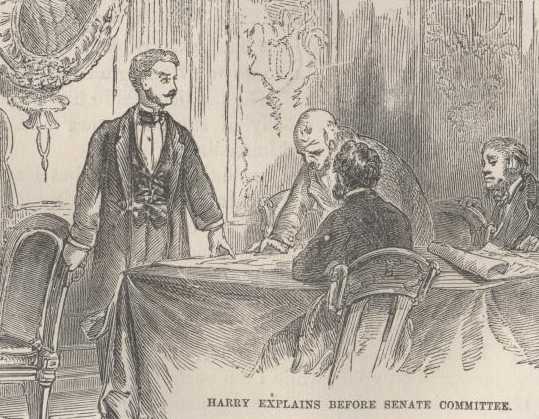
Harry was the guest of Senator Dilworthy. There was scarcely any good movement in which the Senator was not interested. His house was open to all the laborers in the field of total abstinence, and much of his time was taken up in attending the meetings of this cause. He had a Bible class in the Sunday school of the church which he attended, and he suggested to Harry that he might take a class during the time he remained in Washington, Mr. Washington Hawkins had a class. Harry asked the Senator if there was a class of young ladies for him to teach, and after that the Senator did not press the subject.
Philip, if the truth must be told, was not well satisfied with his western prospects, nor altogether with the people he had fallen in with. The railroad contractors held out large but rather indefinite promises. Opportunities for a fortune he did not doubt existed in Missouri, but for himself he saw no better means for livelihood than the mastery of the profession he had rather thoughtlessly entered upon. During the summer he had made considerable practical advance in the science of engineering; he had been diligent, and made himself to a certain extent necessary to the work he was engaged on. The contractors called him into their consultations frequently, as to the character of the country he had been over, and the cost of constructing the road, the nature of the work, etc.
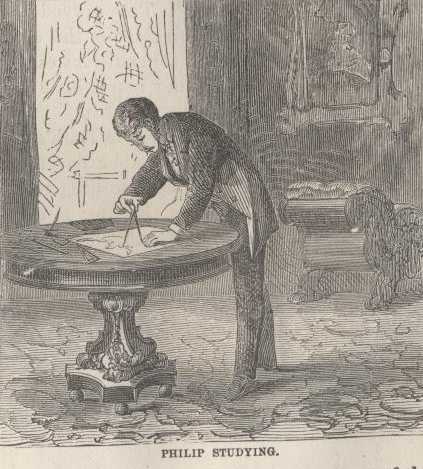
Still Philip felt that if he was going to make either reputation or money as an engineer, he had a great deal of hard study before him, and it is to his credit that he did not shrink from it. While Harry was in Washington dancing attendance upon the national legislature and making the acquaintance of the vast lobby that encircled it, Philip devoted himself day and night, with an energy and a concentration he was capable of, to the learning and theory of his profession, and to the science of railroad building. He wrote some papers at this time for the "Plow, the Loom and the Anvil," upon the strength of materials, and especially upon bridge-building, which attracted considerable attention, and were copied into the English "Practical Magazine." They served at any rate to raise Philip in the opinion of his friends the contractors, for practical men have a certain superstitious estimation of ability with the pen, and though they may a little despise the talent, they are quite ready to make use of it.
Philip sent copies of his performances to Ruth's father and to other gentlemen whose good opinion he coveted, but he did not rest upon his laurels. Indeed, so diligently had he applied himself, that when it came time for him to return to the West, he felt himself, at least in theory, competent to take charge of a division in the field.
The capital of the Great Republic was a new world to country-bred Washington Hawkins. St. Louis was a greater city, but its floating. population did not hail from great distances, and so it had the general family aspect of the permanent population; but Washington gathered its people from the four winds of heaven, and so the manners, the faces and the fashions there, presented a variety that was infinite. Washington had never been in "society" in St. Louis, and he knew nothing of the ways of its wealthier citizens and had never inspected one of their dwellings. Consequently, everything in the nature of modern fashion and grandeur was a new and wonderful revelation to him.
Washington is an interesting city to any of us. It seems to become more and more interesting the oftener we visit it. Perhaps the reader has never been there? Very well. You arrive either at night, rather too late to do anything or see anything until morning, or you arrive so early in the morning that you consider it best to go to your hotel and sleep an hour or two while the sun bothers along over the Atlantic. You cannot well arrive at a pleasant intermediate hour, because the railway corporation that keeps the keys of the only door that leads into the town or out of it take care of that. You arrive in tolerably good spirits, because it is only thirty-eight miles from Baltimore to the capital, and so you have only been insulted three times (provided you are not in a sleeping car—the average is higher there): once when you renewed your ticket after stopping over in Baltimore, once when you were about to enter the "ladies' car" without knowing it was a lady's car, and once When you asked the conductor at what hour you would reach Washington.
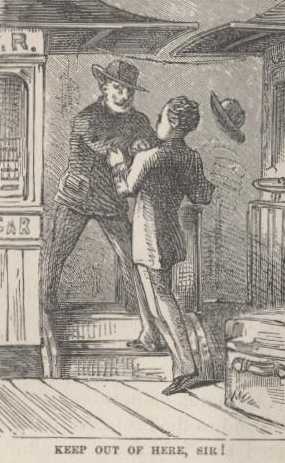
You are assailed by a long rank of hackmen who shake their whips in your
face as you step out upon the sidewalk; you enter what they regard as a
"carriage," in the capital, and you wonder why they do not take it out of
service and put it in the museum: we have few enough antiquities, and
it is little to our credit that we make scarcely any effort to preserve
the few we have.
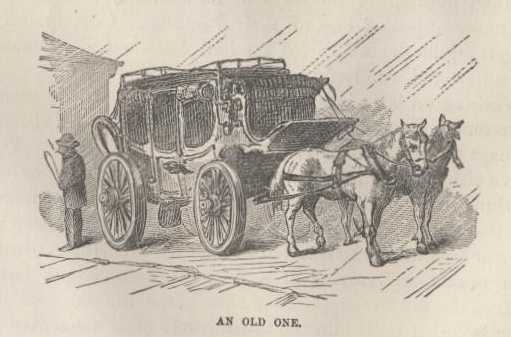
You reach your hotel, presently—and here let us draw the curtain of charity—because of course you have gone to the wrong one. You being a stranger, how could you do otherwise? There are a hundred and eighteen bad hotels, and only one good one. The most renowned and popular hotel of them all is perhaps the worst one known to history.
It is winter, and night. When you arrived, it was snowing. When you reached the hotel, it was sleeting. When you went to bed, it was raining. During the night it froze hard, and the wind blew some chimneys down. When you got up in the morning, it was foggy. When you finished your breakfast at ten o'clock and went out, the sunshine was brilliant, the weather balmy and delicious, and the mud and slush deep and all-pervading. You will like the climate when you get used to it.
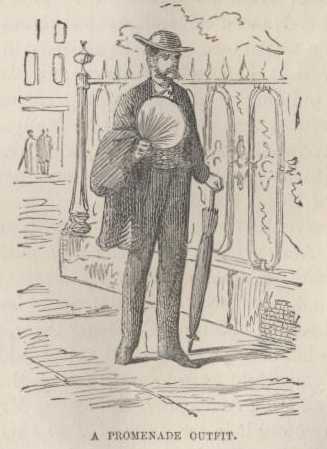
You naturally wish to view the city; so you take an umbrella, an overcoat, and a fan, and go forth. The prominent features you soon locate and get familiar with; first you glimpse the ornamental upper works of a long, snowy palace projecting above a grove of trees, and a tall, graceful white dome with a statue on it surmounting the palace and pleasantly contrasting with the background of blue sky. That building is the capitol; gossips will tell you that by the original estimates it was to cost $12,000,000, and that the government did come within $21,200,000 of building it for that sum.
You stand at the back of the capitol to treat yourself to a view, and it is a very noble one. You understand, the capitol stands upon the verge of a high piece of table land, a fine commanding position, and its front looks out over this noble situation for a city—but it don't see it, for the reason that when the capitol extension was decided upon, the property owners at once advanced their prices to such inhuman figures that the people went down and built the city in the muddy low marsh behind the temple of liberty; so now the lordly front of the building, with, its imposing colonades, its, projecting, graceful wings, its, picturesque groups of statuary, and its long terraced ranges of steps, flowing down in white marble waves to the ground, merely looks out upon a sorrowful little desert of cheap boarding houses.
So you observe, that you take your view from the back of the capitol. And yet not from the airy outlooks of the dome, by the way, because to get there you must pass through the great rotunda: and to do that, you would have to see the marvelous Historical Paintings that hang there, and the bas-reliefs—and what have you done that you should suffer thus? And besides, you might have to pass through the old part of the building, and you could not help seeing Mr. Lincoln, as petrified by a young lady artist for $10,000—and you might take his marble emancipation proclamation, which he holds out in his hand and contemplates, for a folded napkin; and you might conceive from his expression and his attitude, that he is finding fault with the washing. Which is not the case. Nobody knows what is the matter with him; but everybody feels for him. Well, you ought not to go into the dome anyhow, because it would be utterly impossible to go up there without seeing the frescoes in it—and why should you be interested in the delirium tremens of art?
The capitol is a very noble and a very beautiful building, both within
and without, but you need not examine it now. Still, if you greatly
prefer going into the dome, go. Now your general glance gives you
picturesque stretches of gleaming water, on your left, with a sail here
and there and a lunatic asylum on shore; over beyond the water, on a
distant elevation, you see a squat yellow temple which your eye dwells
upon lovingly through a blur of unmanly moisture, for it recalls your
lost boyhood and the Parthenons done in molasses candy which made it
blest and beautiful. Still in the distance, but on this side of the
water and close to its edge, the Monument to the Father of his Country
towers out of the mud—sacred soil is the, customary term. It has the
aspect of a factory chimney with the top broken off. The skeleton of a
decaying scaffolding lingers about its summit, and tradition says that
the spirit of Washington often comes down and sits on those rafters to
enjoy this tribute of respect which the nation has reared as the symbol
of its unappeasable gratitude.
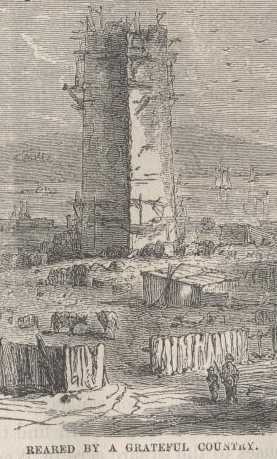
The Monument is to be finished, some day, and at that time our Washington will have risen still higher in the nation's veneration, and will be known as the Great-Great-Grandfather of his Country. The memorial Chimney stands in a quiet pastoral locality that is full of reposeful expression. With a glass you can see the cow-sheds about its base, and the contented sheep nimbling pebbles in the desert solitudes that surround it, and the tired pigs dozing in the holy calm of its protecting shadow.
Now you wrench your gaze loose, and you look down in front of you and see the broad Pennsylvania Avenue stretching straight ahead for a mile or more till it brings up against the iron fence in front of a pillared granite pile, the Treasury building-an edifice that would command respect in any capital. The stores and hotels that wall in this broad avenue are mean, and cheap, and dingy, and are better left without comment. Beyond the Treasury is a fine large white barn, with wide unhandsome grounds about it. The President lives there. It is ugly enough outside, but that is nothing to what it is inside. Dreariness, flimsiness, bad taste reduced to mathematical completeness is what the inside offers to the eye, if it remains yet what it always has been.
The front and right hand views give you the city at large. It is a wide stretch of cheap little brick houses, with here and there a noble architectural pile lifting itself out of the midst-government buildings, these. If the thaw is still going on when you come down and go about town, you will wonder at the short-sightedness of the city fathers, when you come to inspect the streets, in that they do not dilute the mud a little more and use them for canals.
If you inquire around a little, you will find that there are more boardinghouses to the square acre in Washington than there are in any other city in the land, perhaps. If you apply for a home in one of them, it will seem odd to you to have the landlady inspect you with a severe eye and then ask you if you are a member of Congress. Perhaps, just as a pleasantry, you will say yes. And then she will tell you that she is "full." Then you show her her advertisement in the morning paper, and there she stands, convicted and ashamed. She will try to blush, and it will be only polite in you to take the effort for the deed. She shows you her rooms, now, and lets you take one—but she makes you pay in advance for it. That is what you will get for pretending to be a member of Congress. If you had been content to be merely a private citizen, your trunk would have been sufficient security for your board. If you are curious and inquire into this thing, the chances are that your landlady will be ill-natured enough to say that the person and property of a Congressman are exempt from arrest or detention, and that with the tears in her eyes she has seen several of the people's representatives walk off to their several States and Territories carrying her unreceipted board bills in their pockets for keepsakes. And before you have been in Washington many weeks you will be mean enough to believe her, too.
Of course you contrive to see everything and find out everything. And one of the first and most startling things you find out is, that every individual you encounter in the City of Washington almost—and certainly every separate and distinct individual in the public employment, from the highest bureau chief, clear down to the maid who scrubs Department halls, the night watchmen of the public buildings and the darkey boy who purifies the Department spittoons—represents Political Influence. Unless you can get the ear of a Senator, or a Congressman, or a Chief of a Bureau or Department, and persuade him to use his "influence" in your behalf, you cannot get an employment of the most trivial nature in Washington. Mere merit, fitness and capability, are useless baggage to you without "influence." The population of Washington consists pretty much entirely of government employee and the people who board them. There are thousands of these employees, and they have gathered there from every corner of the Union and got their berths through the intercession (command is nearer the word) of the Senators and Representatives of their respective States. It would be an odd circumstance to see a girl get employment at three or four dollars a week in one of the great public cribs without any political grandee to back her, but merely because she was worthy, and competent, and a good citizen of a free country that "treats all persons alike." Washington would be mildly thunderstruck at such a thing as that. If you are a member of Congress, (no offence,) and one of your constituents who doesn't know anything, and does not want to go into the bother of learning something, and has no money, and no employment, and can't earn a living, comes besieging you for help, do you say, "Come, my friend, if your services were valuable you could get employment elsewhere—don't want you here?" Oh, no: You take him to a Department and say, "Here, give this person something to pass away the time at—and a salary"—and the thing is done. You throw him on his country. He is his country's child, let his country support him. There is something good and motherly about Washington, the grand old benevolent National Asylum for the Helpless.
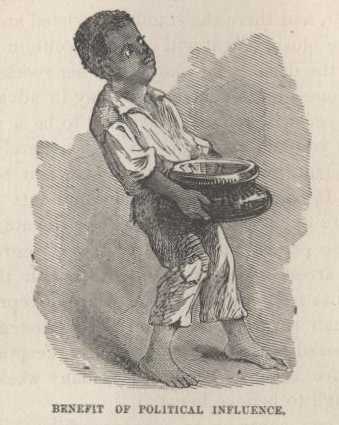
The wages received by this great hive of employees are placed at the liberal figure meet and just for skilled and competent labor. Such of them as are immediately employed about the two Houses of Congress, are not only liberally paid also, but are remembered in the customary Extra Compensation bill which slides neatly through, annually, with the general grab that signalizes the last night of a session, and thus twenty per cent. is added to their wages, for—for fun, no doubt.
Washington Hawkins' new life was an unceasing delight to him. Senator Dilworthy lived sumptuously, and Washington's quarters were charming—gas; running water, hot and cold; bath-room, coal-fires, rich carpets, beautiful pictures on the walls; books on religion, temperance, public charities and financial schemes; trim colored servants, dainty food—everything a body could wish for. And as for stationery, there was no end to it; the government furnished it; postage stamps were not needed—the Senator's frank could convey a horse through the mails, if necessary.
And then he saw such dazzling company. Renowned generals and admirals who had seemed but colossal myths when he was in the far west, went in and out before him or sat at the Senator's table, solidified into palpable flesh and blood; famous statesmen crossed his path daily; that once rare and awe-inspiring being, a Congressman, was become a common spectacle—a spectacle so common, indeed, that he could contemplate it without excitement, even without embarrassment; foreign ministers were visible to the naked eye at happy intervals; he had looked upon the President himself, and lived. And more; this world of enchantment teemed with speculation—the whole atmosphere was thick with hand that indeed was Washington Hawkins' native air; none other refreshed his lungs so gratefully. He had found paradise at last.
The more he saw of his chief the Senator, the more he honored him, and the more conspicuously the moral grandeur of his character appeared to stand out. To possess the friendship and the kindly interest of such a man, Washington said in a letter to Louise, was a happy fortune for a young man whose career had been so impeded and so clouded as his.
The weeks drifted by;—Harry Brierly flirted, danced, added lustre to the brilliant Senatorial receptions, and diligently "buzzed" and "button-holed" Congressmen in the interest of the Columbus River scheme; meantime Senator Dilworthy labored hard in the same interest—and in others of equal national importance. Harry wrote frequently to Sellers, and always encouragingly; and from these letters it was easy to see that Harry was a pet with all Washington, and was likely to carry the thing through; that the assistance rendered him by "old Dilworthy" was pretty fair—pretty fair; "and every little helps, you know," said Harry.
Washington wrote Sellers officially, now and then. In one of his letters it appeared that whereas no member of the House committee favored the scheme at first, there was now needed but one more vote to compass a majority report. Closing sentence:
"Providence seems to further our efforts."
(Signed,) "ABNER DILWORTHY, U. S. S.,
per WASHINGTON HAWKINS, P. S."
At the end of a week, Washington was able to send the happy news, officially, as usual,—that the needed vote had been added and the bill favorably reported from the Committee. Other letters recorded its perils in Committee of the whole, and by and by its victory, by just the skin of its teeth, on third reading and final passage. Then came letters telling of Mr. Dilworthy's struggles with a stubborn majority in his own Committee in the Senate; of how these gentlemen succumbed, one by one, till a majority was secured.
Then there was a hiatus. Washington watched every move on the board, and he was in a good position to do this, for he was clerk of this committee, and also one other. He received no salary as private secretary, but these two clerkships, procured by his benefactor, paid him an aggregate of twelve dollars a day, without counting the twenty percent extra compensation which would of course be voted to him on the last night of the session.
He saw the bill go into Committee of the whole and struggle for its life again, and finally worry through. In the fullness of time he noted its second reading, and by and by the day arrived when the grand ordeal came, and it was put upon its final passage. Washington listened with bated breath to the "Aye!" "No!" "No!" "Aye!" of the voters, for a few dread minutes, and then could bear the suspense no longer. He ran down from the gallery and hurried home to wait.
At the end of two or three hours the Senator arrived in the bosom of his family, and dinner was waiting. Washington sprang forward, with the eager question on his lips, and the Senator said:
"We may rejoice freely, now, my son—Providence has crowned our efforts with success."
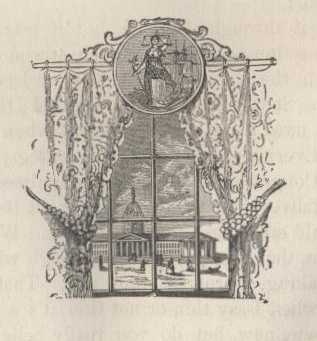
Washington sent grand good news to Col. Sellers that night. To Louise he wrote:
"It is beautiful to hear him talk when his heart is full of thankfulness for some manifestation of the Divine favor. You shall know him, some day my Louise, and knowing him you will honor him, as I do."
Harry wrote:
"I pulled it through, Colonel, but it was a tough job, there is no question about that. There was not a friend to the measure in the House committee when I began, and not a friend in the Senate committee except old Dil himself, but they were all fixed for a majority report when I hauled off my forces. Everybody here says you can't get a thing like this through Congress without buying committees for straight-out cash on delivery, but I think I've taught them a thing or two—if I could only make them believe it. When I tell the old residenters that this thing went through without buying a vote or making a promise, they say, 'That's rather too thin.' And when I say thin or not thin it's a fact, anyway, they say, 'Come, now, but do you really believe that?' and when I say I don't believe anything about it, I know it, they smile and say, 'Well, you are pretty innocent, or pretty blind, one or the other—there's no getting around that.' Why they really do believe that votes have been bought—they do indeed. But let them keep on thinking so. I have found out that if a man knows how to talk to women, and has a little gift in the way of argument with men, he can afford to play for an appropriation against a money bag and give the money bag odds in the game. We've raked in $200,000 of Uncle Sam's money, say what they will—and there is more where this came from, when we want it, and I rather fancy I am the person that can go in and occupy it, too, if I do say it myself, that shouldn't, perhaps. I'll be with you within a week. Scare up all the men you can, and put them to work at once. When I get there I propose to make things hum."
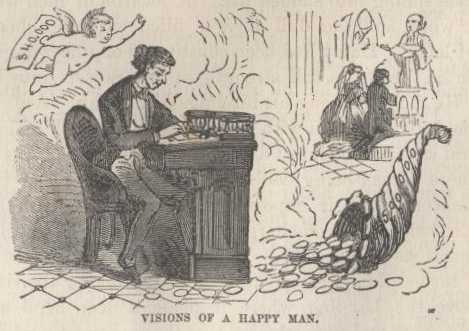
The great news lifted Sellers into the clouds. He went to work on the instant. He flew hither and thither making contracts, engaging men, and steeping his soul in the ecstasies of business. He was the happiest man in Missouri. And Louise was the happiest woman; for presently came a letter from Washington which said:
"Rejoice with me, for the long agony is over! We have waited patiently and faithfully, all these years, and now at last the reward is at hand. A man is to pay our family $40,000 for the Tennessee Land! It is but a little sum compared to what we could get by waiting, but I do so long to see the day when I can call you my own, that I have said to myself, better take this and enjoy life in a humble way than wear out our best days in this miserable separation. Besides, I can put this money into operations here that will increase it a hundred fold, yes, a thousand fold, in a few months. The air is full of such chances, and I know our family would consent in a moment that I should put in their shares with mine. Without a doubt we shall be worth half a million dollars in a year from this time—I put it at the very lowest figure, because it is always best to be on the safe side—half a million at the very lowest calculation, and then your father will give his consent and we can marry at last. Oh, that will be a glorious day. Tell our friends the good news—I want all to share it."
And she did tell her father and mother, but they said, let it be kept still for the present. The careful father also told her to write Washington and warn him not to speculate with the money, but to wait a little and advise with one or two wise old heads. She did this. And she managed to keep the good news to herself, though it would seem that the most careless observer might have seen by her springing step and her radiant countenance that some fine piece of good fortune had descended upon her.
Harry joined the Colonel at Stone's Landing, and that dead place sprang into sudden life. A swarm of men were hard at work, and the dull air was filled with the cheery music of labor. Harry had been constituted engineer-in-general, and he threw the full strength of his powers into his work. He moved among his hirelings like a king. Authority seemed to invest him with a new splendor. Col. Sellers, as general superintendent of a great public enterprise, was all that a mere human being could be—and more. These two grandees went at their imposing "improvement" with the air of men who had been charged with the work of altering the foundations of the globe.
They turned their first attention to straightening the river just above the Landing, where it made a deep bend, and where the maps and plans showed that the process of straightening would not only shorten distance but increase the "fall." They started a cut-off canal across the peninsula formed by the bend, and such another tearing up of the earth and slopping around in the mud as followed the order to the men, had never been seen in that region before. There was such a panic among the turtles that at the end of six hours there was not one to be found within three miles of Stone's Landing. They took the young and the aged, the decrepit and the sick upon their backs and left for tide-water in disorderly procession, the tadpoles following and the bull-frogs bringing up the rear.
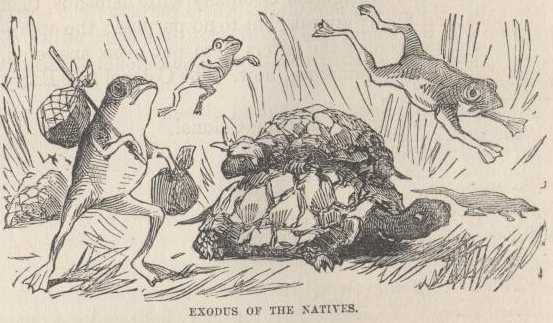
Saturday night came, but the men were obliged to wait, because the appropriation had not come. Harry said he had written to hurry up the money and it would be along presently. So the work continued, on Monday. Stone's Landing was making quite a stir in the vicinity, by this time. Sellers threw a lot or two on the market, "as a feeler," and they sold well. He re-clothed his family, laid in a good stock of provisions, and still had money left. He started a bank account, in a small way—and mentioned the deposit casually to friends; and to strangers, too; to everybody, in fact; but not as a new thing—on the contrary, as a matter of life-long standing. He could not keep from buying trifles every day that were not wholly necessary, it was such a gaudy thing to get out his bank-book and draw a check, instead of using his old customary formula, "Charge it" Harry sold a lot or two, also—and had a dinner party or two at Hawkeye and a general good time with the money. Both men held on pretty strenuously for the coming big prices, however.
At the end of a month things were looking bad. Harry had besieged the New York headquarters of the Columbus River Slack-water Navigation Company with demands, then commands, and finally appeals, but to no purpose; the appropriation did not come; the letters were not even answered. The workmen were clamorous, now. The Colonel and Harry retired to consult.
"What's to be done?" said the Colonel.
"Hang'd if I know."
"Company say anything?"
"Not a word."
"You telegraphed yesterday?"
Yes, and the day before, too."
"No answer?"
"None-confound them!"
Then there was a long pause. Finally both spoke at once:
"I've got it!"
"I've got it!"
"What's yours?" said Harry.
"Give the boys thirty-day orders on the Company for the back pay."
"That's it-that's my own idea to a dot. But then—but then——"
"Yes, I know," said the Colonel; "I know they can't wait for the orders to go to New York and be cashed, but what's the reason they can't get them discounted in Hawkeye?"
"Of course they can. That solves the difficulty. Everybody knows the appropriation's been made and the Company's perfectly good."
So the orders were given and the men appeased, though they grumbled a little at first. The orders went well enough for groceries and such things at a fair discount, and the work danced along gaily for a time. Two or three purchasers put up frame houses at the Landing and moved in, and of course a far-sighted but easy-going journeyman printer wandered along and started the "Napoleon Weekly Telegraph and Literary Repository"—a paper with a Latin motto from the Unabridged dictionary, and plenty of "fat" conversational tales and double-leaded poetry—all for two dollars a year, strictly in advance. Of course the merchants forwarded the orders at once to New York—and never heard of them again.
At the end of some weeks Harry's orders were a drug in the market—nobody would take them at any discount whatever. The second month closed with a riot.—Sellers was absent at the time, and Harry began an active absence himself with the mob at his heels. But being on horseback, he had the advantage. He did not tarry in Hawkeye, but went on, thus missing several appointments with creditors. He was far on his flight eastward, and well out of danger when the next morning dawned. He telegraphed the Colonel to go down and quiet the laborers—he was bound east for money—everything would be right in a week—tell the men so—tell them to rely on him and not be afraid.
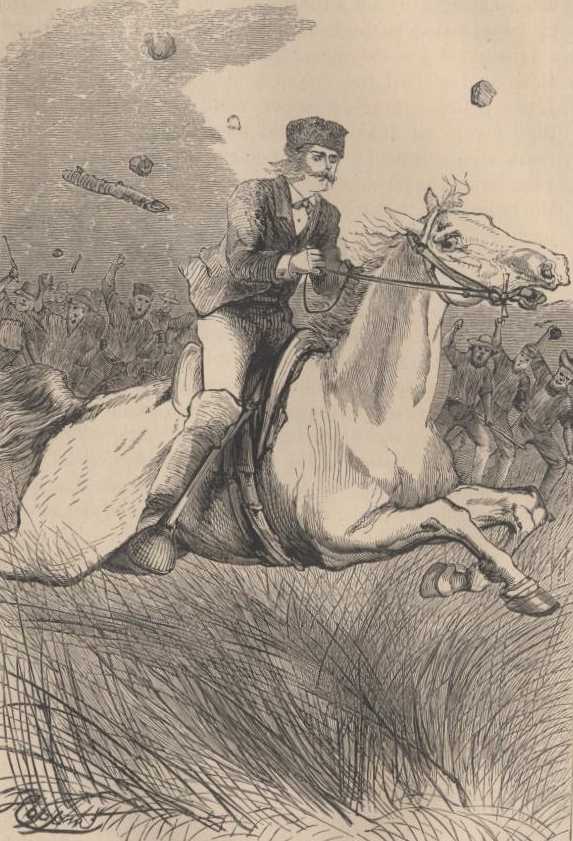
Sellers found the mob quiet enough when he reached the Landing. They had gutted the Navigation office, then piled the beautiful engraved stock-books and things in the middle of the floor and enjoyed the bonfire while it lasted. They had a liking for the Colonel, but still they had some idea of hanging him, as a sort of make-shift that might answer, after a fashion, in place of more satisfactory game.
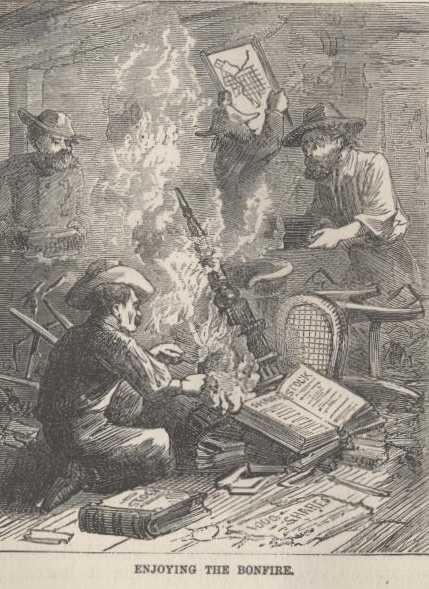
But they made the mistake of waiting to hear what he had to say first. Within fifteen minutes his tongue had done its work and they were all rich men.—He gave every one of them a lot in the suburbs of the city of Stone's Landing, within a mile and a half of the future post office and railway station, and they promised to resume work as soon as Harry got east and started the money along. Now things were blooming and pleasant again, but the men had no money, and nothing to live on. The Colonel divided with them the money he still had in bank—an act which had nothing surprising about it because he was generally ready to divide whatever he had with anybody that wanted it, and it was owing to this very trait that his family spent their days in poverty and at times were pinched with famine.
When the men's minds had cooled and Sellers was gone, they hated themselves for letting him beguile them with fine speeches, but it was too late, now—they agreed to hang him another time—such time as Providence should appoint.
Rumors of Ruth's frivolity and worldliness at Fallkill traveled to Philadelphia in due time, and occasioned no little undertalk among the Bolton relatives.
Hannah Shoecraft told another, cousin that, for her part, she never believed that Ruth had so much more "mind" than other people; and Cousin Hulda added that she always thought Ruth was fond of admiration, and that was the reason she was unwilling to wear plain clothes and attend Meeting. The story that Ruth was "engaged" to a young gentleman of fortune in Fallkill came with the other news, and helped to give point to the little satirical remarks that went round about Ruth's desire to be a doctor!
Margaret Bolton was too wise to be either surprised or alarmed by these rumors. They might be true; she knew a woman's nature too well to think them improbable, but she also knew how steadfast Ruth was in her purposes, and that, as a brook breaks into ripples and eddies and dances and sports by the way, and yet keeps on to the sea, it was in Ruth's nature to give back cheerful answer to the solicitations of friendliness and pleasure, to appear idly delaying even, and sporting in the sunshine, while the current of her resolution flowed steadily on.
That Ruth had this delight in the mere surface play of life that she could, for instance, be interested in that somewhat serious by-play called "flirtation," or take any delight in the exercise of those little arts of pleasing and winning which are none the less genuine and charming because they are not intellectual, Ruth, herself, had never suspected until she went to Fallkill. She had believed it her duty to subdue her gaiety of temperament, and let nothing divert her from what are called serious pursuits: In her limited experience she brought everything to the judgment of her own conscience, and settled the affairs of all the world in her own serene judgment hall. Perhaps her mother saw this, and saw also that there was nothing in the Friends' society to prevent her from growing more and more opinionated.
When Ruth returned to Philadelphia, it must be confessed—though it would not have been by her—that a medical career did seem a little less necessary for her than formerly; and coming back in a glow of triumph, as it were, and in the consciousness of the freedom and life in a lively society and in new and sympathetic friendship, she anticipated pleasure in an attempt to break up the stiffness and levelness of the society at home, and infusing into it something of the motion and sparkle which were so agreeable at Fallkill. She expected visits from her new friends, she would have company, the new books and the periodicals about which all the world was talking, and, in short, she would have life.
For a little while she lived in this atmosphere which she had brought with her. Her mother was delighted with this change in her, with the improvement in her health and the interest she exhibited in home affairs. Her father enjoyed the society of his favorite daughter as he did few things besides; he liked her mirthful and teasing ways, and not less a keen battle over something she had read. He had been a great reader all his life, and a remarkable memory had stored his mind with encyclopaedic information. It was one of Ruth's delights to cram herself with some out of the way subject and endeavor to catch her father; but she almost always failed. Mr. Bolton liked company, a house full of it, and the mirth of young people, and he would have willingly entered into any revolutionary plans Ruth might have suggested in relation to Friends' society.
But custom and the fixed order are stronger than the most enthusiastic and rebellious young lady, as Ruth very soon found. In spite of all her brave efforts, her frequent correspondence, and her determined animation, her books and her music, she found herself settling into the clutches of the old monotony, and as she realized the hopelessness of her endeavors, the medical scheme took new hold of her, and seemed to her the only method of escape.
"Mother, thee does not know how different it is in Fallkill, how much more interesting the people are one meets, how much more life there is."
"But thee will find the world, child, pretty much all the same, when thee knows it better. I thought once as thee does now, and had as little thought of being a Friend as thee has. Perhaps when thee has seen more, thee will better appreciate a quiet life."
"Thee married young. I shall not marry young, and perhaps not at all," said Ruth, with a look of vast experience.
"Perhaps thee doesn't know thee own mind; I have known persons of thy age who did not. Did thee see anybody whom thee would like to live with always in Fallkill?"
"Not always," replied Ruth with a little laugh. "Mother, I think I wouldn't say 'always' to any one until I have a profession and am as independent as he is. Then my love would be a free act, and not in any way a necessity."
Margaret Bolton smiled at this new-fangled philosophy. "Thee will find that love, Ruth, is a thing thee won't reason about, when it comes, nor make any bargains about. Thee wrote that Philip Sterling was at Fallkill."
"Yes, and Henry Brierly, a friend of his; a very amusing young fellow and not so serious-minded as Philip, but a bit of a fop maybe."
"And thee preferred the fop to the serious-minded?"
"I didn't prefer anybody; but Henry Brierly was good company, which Philip wasn't always."
"Did thee know thee father had been in correspondence with Philip?"
Ruth looked up surprised and with a plain question in her eyes.
"Oh, it's not about thee."
"What then?" and if there was any shade of disappointment in her tone, probably Ruth herself did not know it.
"It's about some land up in the country. That man Bigler has got father into another speculation."
"That odious man! Why will father have anything to do with him? Is it that railroad?"
"Yes. Father advanced money and took land as security, and whatever has gone with the money and the bonds, he has on his hands a large tract of wild land."
"And what has Philip to do with that?"
"It has good timber, if it could ever be got out, and father says that there must be coal in it; it's in a coal region. He wants Philip to survey it, and examine it for indications of coal."
"It's another of father's fortunes, I suppose," said Ruth. "He has put away so many fortunes for us that I'm afraid we never shall find them."
Ruth was interested in it nevertheless, and perhaps mainly because Philip was to be connected with the enterprise. Mr. Bigler came to dinner with her father next day, and talked a great deal about Mr. Bolton's magnificent tract of land, extolled the sagacity that led him to secure such a property, and led the talk along to another railroad which would open a northern communication to this very land.
"Pennybacker says it's full of coal, he's no doubt of it, and a railroad to strike the Erie would make it a fortune."
"Suppose you take the land and work the thing up, Mr. Bigler; you may have the tract for three dollars an acre."
"You'd throw it away, then," replied Mr. Bigler, "and I'm not the man to take advantage of a friend. But if you'll put a mortgage on it for the northern road, I wouldn't mind taking an interest, if Pennybacker is willing; but Pennybacker, you know, don't go much on land, he sticks to the legislature." And Mr. Bigler laughed.
When Mr. Bigler had gone, Ruth asked her father about Philip's connection with the land scheme.
"There's nothing definite," said Mr. Bolton. "Philip is showing aptitude for his profession. I hear the best reports of him in New York, though those sharpers don't 'intend to do anything but use him. I've written and offered him employment in surveying and examining the land. We want to know what it is. And if there is anything in it that his enterprise can dig out, he shall have an interest. I should be glad to give the young fellow a lift."
All his life Eli Bolton had been giving young fellows a lift, and shouldering the loses when things turned out unfortunately. His ledger, take-it-altogether, would not show a balance on the right side; but perhaps the losses on his books will turn out to be credits in a world where accounts are kept on a different basis. The left hand of the ledger will appear the right, looked at from the other side.
Philip, wrote to Ruth rather a comical account of the bursting up of the city of Napoleon and the navigation improvement scheme, of Harry's flight and the Colonel's discomfiture. Harry left in such a hurry that he hadn't even time to bid Miss Laura Hawkins good-bye, but he had no doubt that Harry would console himself with the next pretty face he saw—a remark which was thrown in for Ruth's benefit. Col. Sellers had in all probability, by this time, some other equally brilliant speculation in his brain.
As to the railroad, Philip had made up his mind that it was merely kept on foot for speculative purposes in Wall street, and he was about to quit it. Would Ruth be glad to hear, he wondered, that he was coming East? For he was coming, in spite of a letter from Harry in New York, advising him to hold on until he had made some arrangements in regard to contracts, he to be a little careful about Sellers, who was somewhat visionary, Harry said.
The summer went on without much excitement for Ruth. She kept up a correspondence with Alice, who promised a visit in the fall, she read, she earnestly tried to interest herself in home affairs and such people as came to the house; but she found herself falling more and more into reveries, and growing weary of things as they were. She felt that everybody might become in time like two relatives from a Shaker establishment in Ohio, who visited the Boltons about this time, a father and son, clad exactly alike, and alike in manners. The son; however, who was not of age, was more unworldly and sanctimonious than his father; he always addressed his parent as "Brother Plum," and bore himself, altogether in such a superior manner that Ruth longed to put bent pins in his chair. Both father and son wore the long, single breasted collarless coats of their society, without buttons, before or behind, but with a row of hooks and eyes on either side in front. It was Ruth's suggestion that the coats would be improved by a single hook and eye sewed on in the small of the back where the buttons usually are.
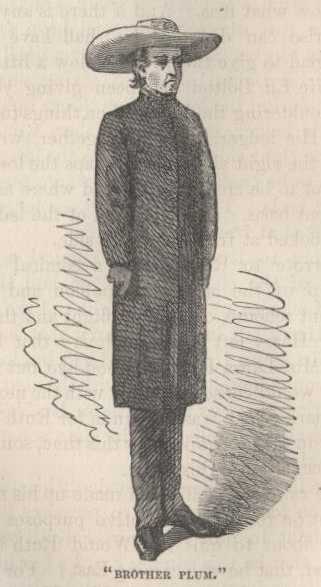
Amusing as this Shaker caricature of the Friends was, it oppressed Ruth beyond measure; and increased her feeling of being stifled.
It was a most unreasonable feeling. No home could be pleasanter than Ruth's. The house, a little out of the city; was one of those elegant country residences which so much charm visitors to the suburbs of Philadelphia. A modern dwelling and luxurious in everything that wealth could suggest for comfort, it stood in the midst of exquisitely kept lawns, with groups of trees, parterres of flowers massed in colors, with greenhouse, grapery and garden; and on one side, the garden sloped away in undulations to a shallow brook that ran over a pebbly bottom and sang under forest trees. The country about teas the perfection of cultivated landscape, dotted with cottages, and stately mansions of Revolutionary date, and sweet as an English country-side, whether seen in the soft bloom of May or in the mellow ripeness of late October.
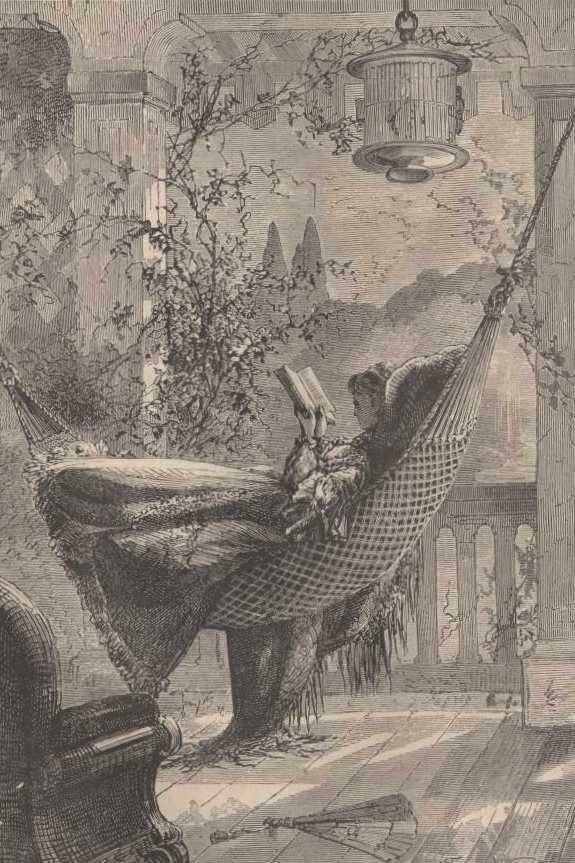
It needed only the peace of the mind within, to make it a paradise. One riding by on the Old Germantown road, and seeing a young girl swinging in the hammock on the piazza and, intent upon some volume of old poetry or the latest novel, would no doubt have envied a life so idyllic. He could not have imagined that the young girl was reading a volume of reports of clinics and longing to be elsewhere.
Ruth could not have been more discontented if all the wealth about her had been as unsubstantial as a dream. Perhaps she so thought it.
"I feel," she once said to her father, "as if I were living in a house of cards."
"And thee would like to turn it into a hospital?"
"No. But tell me father," continued Ruth, not to be put off, "is thee still going on with that Bigler and those other men who come here and entice thee?"
Mr. Bolton smiled, as men do when they talk with women about "business" "Such men have their uses, Ruth. They keep the world active, and I owe a great many of my best operations to such men. Who knows, Ruth, but this new land purchase, which I confess I yielded a little too much to Bigler in, may not turn out a fortune for thee and the rest of the children?"
"Ah, father, thee sees every thing in a rose-colored light. I do believe thee wouldn't have so readily allowed me to begin the study of medicine, if it hadn't had the novelty of an experiment to thee."
"And is thee satisfied with it?"
"If thee means, if I have had enough of it, no. I just begin to see what I can do in it, and what a noble profession it is for a woman. Would thee have me sit here like a bird on a bough and wait for somebody to come and put me in a cage?"
Mr. Bolton was not sorry to divert the talk from his own affairs, and he did not think it worth while to tell his family of a performance that very day which was entirely characteristic of him.
Ruth might well say that she felt as if she were living in a house of cards, although the Bolton household had no idea of the number of perils that hovered over them, any more than thousands of families in America have of the business risks and contingences upon which their prosperity and luxury hang.
A sudden call upon Mr. Bolton for a large sum of money, which must be forthcoming at once, had found him in the midst of a dozen ventures, from no one of which a dollar could be realized. It was in vain that he applied to his business acquaintances and friends; it was a period of sudden panic and no money. "A hundred thousand! Mr. Bolton," said Plumly. "Good God, if you should ask me for ten, I shouldn't know where to get it."
And yet that day Mr. Small (Pennybacker, Bigler and Small) came to Mr. Bolton with a piteous story of ruin in a coal operation, if he could not raise ten thousand dollars. Only ten, and he was sure of a fortune. Without it he was a beggar. Mr. Bolton had already Small's notes for a large amount in his safe, labeled "doubtful;" he had helped him again and again, and always with the same result. But Mr. Small spoke with a faltering voice of his family, his daughter in school, his wife ignorant of his calamity, and drew such a picture of their agony, that Mr. Bolton put by his own more pressing necessity, and devoted the day to scraping together, here and there, ten thousand dollars for this brazen beggar, who had never kept a promise to him nor paid a debt.
Beautiful credit! The foundation of modern society. Who shall say that this is not the golden age of mutual trust, of unlimited reliance upon human promises? That is a peculiar condition of society which enables a whole nation to instantly recognize point and meaning in the familiar newspaper anecdote, which puts into the mouth of a distinguished speculator in lands and mines this remark:—"I wasn't worth a cent two years ago, and now I owe two millions of dollars."
It was a hard blow to poor Sellers to see the work on his darling enterprise stop, and the noise and bustle and confusion that had been such refreshment to his soul, sicken and die out. It was hard to come down to humdrum ordinary life again after being a General Superintendent and the most conspicuous man in the community. It was sad to see his name disappear from the newspapers; sadder still to see it resurrected at intervals, shorn of its aforetime gaudy gear of compliments and clothed on with rhetorical tar and feathers.
But his friends suffered more on his account than he did. He was a cork that could not be kept under the water many moments at a time.
He had to bolster up his wife's spirits every now and then. On one of these occasions he said:
"It's all right, my dear, all right; it will all come right in a little while. There's $200,000 coming, and that will set things booming again: Harry seems to be having some difficulty, but that's to be expected—you can't move these big operations to the tune of Fisher's Hornpipe, you know. But Harry will get it started along presently, and then you'll see! I expect the news every day now."
"But Beriah, you've been expecting it every day, all along, haven't you?"
"Well, yes; yes—I don't know but I have. But anyway, the longer it's delayed, the nearer it grows to the time when it will start—same as every day you live brings you nearer to—nearer—"
"The grave?"
"Well, no—not that exactly; but you can't understand these things, Polly dear—women haven't much head for business, you know. You make yourself perfectly comfortable, old lady, and you'll see how we'll trot this right along. Why bless you, let the appropriation lag, if it wants to—that's no great matter—there's a bigger thing than that."
"Bigger than $200,000, Beriah?"
"Bigger, child?—why, what's $200,000? Pocket money! Mere pocket money! Look at the railroad! Did you forget the railroad? It ain't many months till spring; it will be coming right along, and the railroad swimming right along behind it. Where'll it be by the middle of summer? Just stop and fancy a moment—just think a little—don't anything suggest itself? Bless your heart, you dear women live right in the present all the time—but a man, why a man lives——
"In the future, Beriah? But don't we live in the future most too much, Beriah? We do somehow seem to manage to live on next year's crop of corn and potatoes as a general thing while this year is still dragging along, but sometimes it's not a robust diet,—Beriah. But don't look that way, dear—don't mind what I say. I don't mean to fret, I don't mean to worry; and I don't, once a month, do I, dear? But when I get a little low and feel bad, I get a bit troubled and worrisome, but it don't mean anything in the world. It passes right away. I know you're doing all you can, and I don't want to seem repining and ungrateful—for I'm not, Beriah—you know I'm not, don't you?"
"Lord bless you, child, I know you are the very best little woman that ever lived—that ever lived on the whole face of the Earth! And I know that I would be a dog not to work for you and think for you and scheme for you with all my might. And I'll bring things all right yet, honey—cheer up and don't you fear. The railroad——"
"Oh, I had forgotten the railroad, dear, but when a body gets blue, a body forgets everything. Yes, the railroad—tell me about the railroad."
"Aha, my girl, don't you see? Things ain't so dark, are they? Now I didn't forget the railroad. Now just think for a moment—just figure up a little on the future dead moral certainties. For instance, call this waiter St. Louis.
"And we'll lay this fork (representing the railroad) from St. Louis to this potato, which is Slouchburg:
"Then with this carving knife we'll continue the railroad from Slouchburg to Doodleville, shown by the black pepper:
"Then we run along the—yes—the comb—to the tumbler that's Brimstone:
"Thence by the pipe to Belshazzar, which is the salt-cellar:
"Thence to, to—that quill—Catfish—hand me the pincushion, Marie Antoinette:


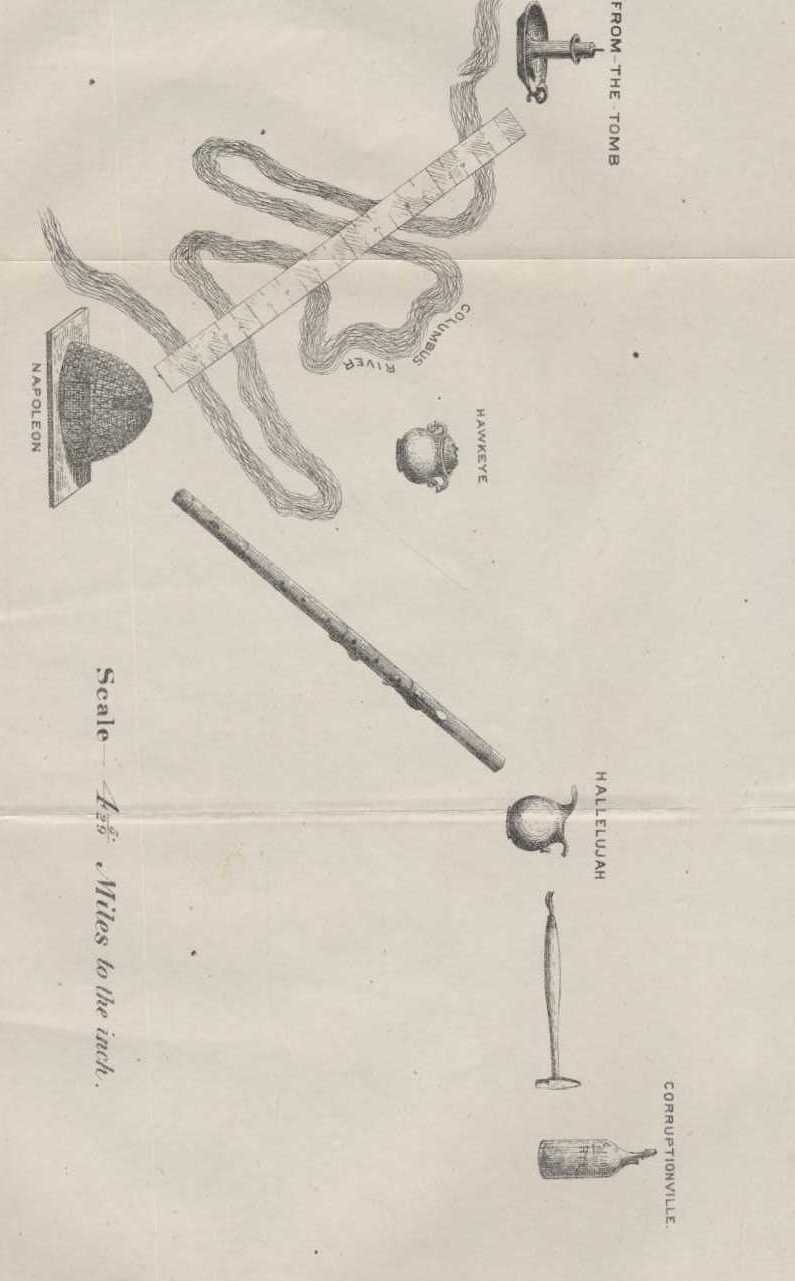
"Thence right along these shears to this horse, Babylon:
"Then by the spoon to Bloody Run—thank you, the ink:
"Thence to Hail Columbia—snuffers, Polly, please move that cup and saucer close up, that's Hail Columbia:
"Then—let me open my knife—to Hark-from-the-Tomb, where we'll put the candle-stick—only a little distance from Hail Columbia to Hark-from-the-Tomb—down-grade all the way.
"And there we strike Columbus River—pass me two or throe skeins of thread to stand for the river; the sugar bowl will do for Hawkeye, and the rat trap for Stone's Landing-Napoleon, I mean—and you can see how much better Napoleon is located than Hawkeye. Now here you are with your railroad complete, and showing its continuation to Hallelujah and thence to Corruptionville.
"Now then-them you are! It's a beautiful road, beautiful. Jeff Thompson can out-engineer any civil engineer that ever sighted through an aneroid, or a theodolite, or whatever they call it—he calls it sometimes one and sometimes the other just whichever levels off his sentence neatest, I reckon. But ain't it a ripping toad, though? I tell you, it'll make a stir when it gets along. Just see what a country it goes through. There's your onions at Slouchburg—noblest onion country that graces God's footstool; and there's your turnip country all around Doodleville—bless my life, what fortunes are going to be made there when they get that contrivance perfected for extracting olive oil out of turnips—if there's any in them; and I reckon there is, because Congress has made an appropriation of money to test the thing, and they wouldn't have done that just on conjecture, of course. And now we come to the Brimstone region—cattle raised there till you can't rest—and corn, and all that sort of thing. Then you've got a little stretch along through Belshazzar that don't produce anything now—at least nothing but rocks—but irrigation will fetch it. Then from Catfish to Babylon it's a little swampy, but there's dead loads of peat down under there somewhere. Next is the Bloody Run and Hail Columbia country—tobacco enough can be raised there to support two such railroads. Next is the sassparilla region. I reckon there's enough of that truck along in there on the line of the pocket-knife, from Hail Columbia to Hark-from-the Tomb to fat up all the consumptives in all the hospitals from Halifax to the Holy Land. It just grows like weeds! I've got a little belt of sassparilla land in there just tucked away unobstrusively waiting for my little Universal Expectorant to get into shape in my head. And I'll fix that, you know. One of these days I'll have all the nations of the earth expecto—"
"But Beriah, dear—"
"Don't interrupt me; Polly—I don't want you to lose the run of the map—well, take your toy-horse, James Fitz-James, if you must have it—and run along with you. Here, now—the soap will do for Babylon. Let me see—where was I? Oh yes—now we run down to Stone's Lan—Napoleon—now we run down to Napoleon. Beautiful road. Look at that, now. Perfectly straight line-straight as the way to the grave.
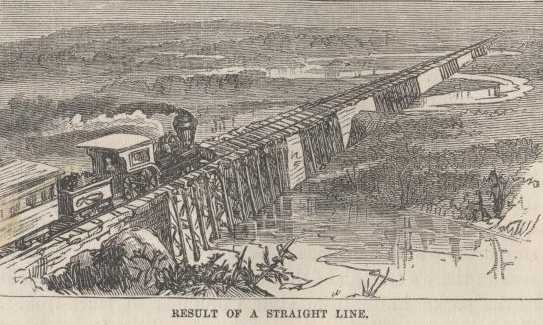
And see where it leaves Hawkeye-clear out in the cold, my dear, clear out in the cold. That town's as bound to die as—well if I owned it I'd get its obituary ready, now, and notify the mourners. Polly, mark my words—in three years from this, Hawkeye'll be a howling wilderness. You'll see. And just look at that river—noblest stream that meanders over the thirsty earth!—calmest, gentlest artery that refreshes her weary bosom! Railroad goes all over it and all through it—wades right along on stilts. Seventeen bridges in three miles and a half-forty-nine bridges from Hark-from-the-Tomb to Stone's Landing altogether—forty nine bridges, and culverts enough to culvert creation itself! Hadn't skeins of thread enough to represent them all—but you get an idea—perfect trestle-work of bridges for seventy two miles: Jeff Thompson and I fixed all that, you know; he's to get the contracts and I'm to put them through on the divide. Just oceans of money in those bridges. It's the only part of the railroad I'm interested in,—down along the line—and it's all I want, too. It's enough, I should judge. Now here we are at Napoleon. Good enough country plenty good enough—all it wants is population. That's all right—that will come. And it's no bad country now for calmness and solitude, I can tell you—though there's no money in that, of course. No money, but a man wants rest, a man wants peace—a man don't want to rip and tear around all the time. And here we go, now, just as straight as a string for Hallelujah—it's a beautiful angle—handsome up grade all the way—and then away you go to Corruptionville, the gaudiest country for early carrots and cauliflowers that ever—good missionary field, too. There ain't such another missionary field outside the jungles of Central Africa. And patriotic?—why they named it after Congress itself. Oh, I warn you, my dear, there's a good time coming, and it'll be right along before you know what you're about, too. That railroad's fetching it. You see what it is as far as I've got, and if I had enough bottles and soap and boot-jacks and such things to carry it along to where it joins onto the Union Pacific, fourteen hundred miles from here, I should exhibit to you in that little internal improvement a spectacle of inconceivable sublimity. So, don't you see? We've got the rail road to fall back on; and in the meantime, what are we worrying about that $200,000 appropriation for? That's all right. I'd be willing to bet anything that the very next letter that comes from Harry will—"
The eldest boy entered just in the nick of time and brought a letter, warm from the post-office.
"Things do look bright, after all, Beriah. I'm sorry I was blue, but it did seem as if everything had been going against us for whole ages. Open the letter—open it quick, and let's know all about it before we stir out of our places. I am all in a fidget to know what it says."
The letter was opened, without any unnecessary delay.
End of the Project Gutenberg EBook of The Gilded Age, Part 3.
by Mark Twain (Samuel Clemens) and Charles Dudley Warner
*** END OF THIS PROJECT GUTENBERG EBOOK THE GILDED AGE, PART 3. ***
***** This file should be named 5820-h.htm or 5820-h.zip *****
This and all associated files of various formats will be found in:
https://www.gutenberg.org/5/8/2/5820/
Produced by David Widger
Updated editions will replace the previous one--the old editions
will be renamed.
Creating the works from public domain print editions means that no
one owns a United States copyright in these works, so the Foundation
(and you!) can copy and distribute it in the United States without
permission and without paying copyright royalties. Special rules,
set forth in the General Terms of Use part of this license, apply to
copying and distributing Project Gutenberg-tm electronic works to
protect the PROJECT GUTENBERG-tm concept and trademark. Project
Gutenberg is a registered trademark, and may not be used if you
charge for the eBooks, unless you receive specific permission. If you
do not charge anything for copies of this eBook, complying with the
rules is very easy. You may use this eBook for nearly any purpose
such as creation of derivative works, reports, performances and
research. They may be modified and printed and given away--you may do
practically ANYTHING with public domain eBooks. Redistribution is
subject to the trademark license, especially commercial
redistribution.
*** START: FULL LICENSE ***
THE FULL PROJECT GUTENBERG LICENSE
PLEASE READ THIS BEFORE YOU DISTRIBUTE OR USE THIS WORK
To protect the Project Gutenberg-tm mission of promoting the free
distribution of electronic works, by using or distributing this work
(or any other work associated in any way with the phrase "Project
Gutenberg"), you agree to comply with all the terms of the Full Project
Gutenberg-tm License (available with this file or online at
https://gutenberg.org/license).
Section 1. General Terms of Use and Redistributing Project Gutenberg-tm
electronic works
1.A. By reading or using any part of this Project Gutenberg-tm
electronic work, you indicate that you have read, understand, agree to
and accept all the terms of this license and intellectual property
(trademark/copyright) agreement. If you do not agree to abide by all
the terms of this agreement, you must cease using and return or destroy
all copies of Project Gutenberg-tm electronic works in your possession.
If you paid a fee for obtaining a copy of or access to a Project
Gutenberg-tm electronic work and you do not agree to be bound by the
terms of this agreement, you may obtain a refund from the person or
entity to whom you paid the fee as set forth in paragraph 1.E.8.
1.B. "Project Gutenberg" is a registered trademark. It may only be
used on or associated in any way with an electronic work by people who
agree to be bound by the terms of this agreement. There are a few
things that you can do with most Project Gutenberg-tm electronic works
even without complying with the full terms of this agreement. See
paragraph 1.C below. There are a lot of things you can do with Project
Gutenberg-tm electronic works if you follow the terms of this agreement
and help preserve free future access to Project Gutenberg-tm electronic
works. See paragraph 1.E below.
1.C. The Project Gutenberg Literary Archive Foundation ("the Foundation"
or PGLAF), owns a compilation copyright in the collection of Project
Gutenberg-tm electronic works. Nearly all the individual works in the
collection are in the public domain in the United States. If an
individual work is in the public domain in the United States and you are
located in the United States, we do not claim a right to prevent you from
copying, distributing, performing, displaying or creating derivative
works based on the work as long as all references to Project Gutenberg
are removed. Of course, we hope that you will support the Project
Gutenberg-tm mission of promoting free access to electronic works by
freely sharing Project Gutenberg-tm works in compliance with the terms of
this agreement for keeping the Project Gutenberg-tm name associated with
the work. You can easily comply with the terms of this agreement by
keeping this work in the same format with its attached full Project
Gutenberg-tm License when you share it without charge with others.
1.D. The copyright laws of the place where you are located also govern
what you can do with this work. Copyright laws in most countries are in
a constant state of change. If you are outside the United States, check
the laws of your country in addition to the terms of this agreement
before downloading, copying, displaying, performing, distributing or
creating derivative works based on this work or any other Project
Gutenberg-tm work. The Foundation makes no representations concerning
the copyright status of any work in any country outside the United
States.
1.E. Unless you have removed all references to Project Gutenberg:
1.E.1. The following sentence, with active links to, or other immediate
access to, the full Project Gutenberg-tm License must appear prominently
whenever any copy of a Project Gutenberg-tm work (any work on which the
phrase "Project Gutenberg" appears, or with which the phrase "Project
Gutenberg" is associated) is accessed, displayed, performed, viewed,
copied or distributed:
This eBook is for the use of anyone anywhere at no cost and with
almost no restrictions whatsoever. You may copy it, give it away or
re-use it under the terms of the Project Gutenberg License included
with this eBook or online at www.gutenberg.org
1.E.2. If an individual Project Gutenberg-tm electronic work is derived
from the public domain (does not contain a notice indicating that it is
posted with permission of the copyright holder), the work can be copied
and distributed to anyone in the United States without paying any fees
or charges. If you are redistributing or providing access to a work
with the phrase "Project Gutenberg" associated with or appearing on the
work, you must comply either with the requirements of paragraphs 1.E.1
through 1.E.7 or obtain permission for the use of the work and the
Project Gutenberg-tm trademark as set forth in paragraphs 1.E.8 or
1.E.9.
1.E.3. If an individual Project Gutenberg-tm electronic work is posted
with the permission of the copyright holder, your use and distribution
must comply with both paragraphs 1.E.1 through 1.E.7 and any additional
terms imposed by the copyright holder. Additional terms will be linked
to the Project Gutenberg-tm License for all works posted with the
permission of the copyright holder found at the beginning of this work.
1.E.4. Do not unlink or detach or remove the full Project Gutenberg-tm
License terms from this work, or any files containing a part of this
work or any other work associated with Project Gutenberg-tm.
1.E.5. Do not copy, display, perform, distribute or redistribute this
electronic work, or any part of this electronic work, without
prominently displaying the sentence set forth in paragraph 1.E.1 with
active links or immediate access to the full terms of the Project
Gutenberg-tm License.
1.E.6. You may convert to and distribute this work in any binary,
compressed, marked up, nonproprietary or proprietary form, including any
word processing or hypertext form. However, if you provide access to or
distribute copies of a Project Gutenberg-tm work in a format other than
"Plain Vanilla ASCII" or other format used in the official version
posted on the official Project Gutenberg-tm web site (www.gutenberg.org),
you must, at no additional cost, fee or expense to the user, provide a
copy, a means of exporting a copy, or a means of obtaining a copy upon
request, of the work in its original "Plain Vanilla ASCII" or other
form. Any alternate format must include the full Project Gutenberg-tm
License as specified in paragraph 1.E.1.
1.E.7. Do not charge a fee for access to, viewing, displaying,
performing, copying or distributing any Project Gutenberg-tm works
unless you comply with paragraph 1.E.8 or 1.E.9.
1.E.8. You may charge a reasonable fee for copies of or providing
access to or distributing Project Gutenberg-tm electronic works provided
that
- You pay a royalty fee of 20% of the gross profits you derive from
the use of Project Gutenberg-tm works calculated using the method
you already use to calculate your applicable taxes. The fee is
owed to the owner of the Project Gutenberg-tm trademark, but he
has agreed to donate royalties under this paragraph to the
Project Gutenberg Literary Archive Foundation. Royalty payments
must be paid within 60 days following each date on which you
prepare (or are legally required to prepare) your periodic tax
returns. Royalty payments should be clearly marked as such and
sent to the Project Gutenberg Literary Archive Foundation at the
address specified in Section 4, "Information about donations to
the Project Gutenberg Literary Archive Foundation."
- You provide a full refund of any money paid by a user who notifies
you in writing (or by e-mail) within 30 days of receipt that s/he
does not agree to the terms of the full Project Gutenberg-tm
License. You must require such a user to return or
destroy all copies of the works possessed in a physical medium
and discontinue all use of and all access to other copies of
Project Gutenberg-tm works.
- You provide, in accordance with paragraph 1.F.3, a full refund of any
money paid for a work or a replacement copy, if a defect in the
electronic work is discovered and reported to you within 90 days
of receipt of the work.
- You comply with all other terms of this agreement for free
distribution of Project Gutenberg-tm works.
1.E.9. If you wish to charge a fee or distribute a Project Gutenberg-tm
electronic work or group of works on different terms than are set
forth in this agreement, you must obtain permission in writing from
both the Project Gutenberg Literary Archive Foundation and Michael
Hart, the owner of the Project Gutenberg-tm trademark. Contact the
Foundation as set forth in Section 3 below.
1.F.
1.F.1. Project Gutenberg volunteers and employees expend considerable
effort to identify, do copyright research on, transcribe and proofread
public domain works in creating the Project Gutenberg-tm
collection. Despite these efforts, Project Gutenberg-tm electronic
works, and the medium on which they may be stored, may contain
"Defects," such as, but not limited to, incomplete, inaccurate or
corrupt data, transcription errors, a copyright or other intellectual
property infringement, a defective or damaged disk or other medium, a
computer virus, or computer codes that damage or cannot be read by
your equipment.
1.F.2. LIMITED WARRANTY, DISCLAIMER OF DAMAGES - Except for the "Right
of Replacement or Refund" described in paragraph 1.F.3, the Project
Gutenberg Literary Archive Foundation, the owner of the Project
Gutenberg-tm trademark, and any other party distributing a Project
Gutenberg-tm electronic work under this agreement, disclaim all
liability to you for damages, costs and expenses, including legal
fees. YOU AGREE THAT YOU HAVE NO REMEDIES FOR NEGLIGENCE, STRICT
LIABILITY, BREACH OF WARRANTY OR BREACH OF CONTRACT EXCEPT THOSE
PROVIDED IN PARAGRAPH F3. YOU AGREE THAT THE FOUNDATION, THE
TRADEMARK OWNER, AND ANY DISTRIBUTOR UNDER THIS AGREEMENT WILL NOT BE
LIABLE TO YOU FOR ACTUAL, DIRECT, INDIRECT, CONSEQUENTIAL, PUNITIVE OR
INCIDENTAL DAMAGES EVEN IF YOU GIVE NOTICE OF THE POSSIBILITY OF SUCH
DAMAGE.
1.F.3. LIMITED RIGHT OF REPLACEMENT OR REFUND - If you discover a
defect in this electronic work within 90 days of receiving it, you can
receive a refund of the money (if any) you paid for it by sending a
written explanation to the person you received the work from. If you
received the work on a physical medium, you must return the medium with
your written explanation. The person or entity that provided you with
the defective work may elect to provide a replacement copy in lieu of a
refund. If you received the work electronically, the person or entity
providing it to you may choose to give you a second opportunity to
receive the work electronically in lieu of a refund. If the second copy
is also defective, you may demand a refund in writing without further
opportunities to fix the problem.
1.F.4. Except for the limited right of replacement or refund set forth
in paragraph 1.F.3, this work is provided to you 'AS-IS' WITH NO OTHER
WARRANTIES OF ANY KIND, EXPRESS OR IMPLIED, INCLUDING BUT NOT LIMITED TO
WARRANTIES OF MERCHANTIBILITY OR FITNESS FOR ANY PURPOSE.
1.F.5. Some states do not allow disclaimers of certain implied
warranties or the exclusion or limitation of certain types of damages.
If any disclaimer or limitation set forth in this agreement violates the
law of the state applicable to this agreement, the agreement shall be
interpreted to make the maximum disclaimer or limitation permitted by
the applicable state law. The invalidity or unenforceability of any
provision of this agreement shall not void the remaining provisions.
1.F.6. INDEMNITY - You agree to indemnify and hold the Foundation, the
trademark owner, any agent or employee of the Foundation, anyone
providing copies of Project Gutenberg-tm electronic works in accordance
with this agreement, and any volunteers associated with the production,
promotion and distribution of Project Gutenberg-tm electronic works,
harmless from all liability, costs and expenses, including legal fees,
that arise directly or indirectly from any of the following which you do
or cause to occur: (a) distribution of this or any Project Gutenberg-tm
work, (b) alteration, modification, or additions or deletions to any
Project Gutenberg-tm work, and (c) any Defect you cause.
Section 2. Information about the Mission of Project Gutenberg-tm
Project Gutenberg-tm is synonymous with the free distribution of
electronic works in formats readable by the widest variety of computers
including obsolete, old, middle-aged and new computers. It exists
because of the efforts of hundreds of volunteers and donations from
people in all walks of life.
Volunteers and financial support to provide volunteers with the
assistance they need, is critical to reaching Project Gutenberg-tm's
goals and ensuring that the Project Gutenberg-tm collection will
remain freely available for generations to come. In 2001, the Project
Gutenberg Literary Archive Foundation was created to provide a secure
and permanent future for Project Gutenberg-tm and future generations.
To learn more about the Project Gutenberg Literary Archive Foundation
and how your efforts and donations can help, see Sections 3 and 4
and the Foundation web page at https://www.pglaf.org.
Section 3. Information about the Project Gutenberg Literary Archive
Foundation
The Project Gutenberg Literary Archive Foundation is a non profit
501(c)(3) educational corporation organized under the laws of the
state of Mississippi and granted tax exempt status by the Internal
Revenue Service. The Foundation's EIN or federal tax identification
number is 64-6221541. Its 501(c)(3) letter is posted at
https://pglaf.org/fundraising. Contributions to the Project Gutenberg
Literary Archive Foundation are tax deductible to the full extent
permitted by U.S. federal laws and your state's laws.
The Foundation's principal office is located at 4557 Melan Dr. S.
Fairbanks, AK, 99712., but its volunteers and employees are scattered
throughout numerous locations. Its business office is located at
809 North 1500 West, Salt Lake City, UT 84116, (801) 596-1887, email
business@pglaf.org. Email contact links and up to date contact
information can be found at the Foundation's web site and official
page at https://pglaf.org
For additional contact information:
Dr. Gregory B. Newby
Chief Executive and Director
gbnewby@pglaf.org
Section 4. Information about Donations to the Project Gutenberg
Literary Archive Foundation
Project Gutenberg-tm depends upon and cannot survive without wide
spread public support and donations to carry out its mission of
increasing the number of public domain and licensed works that can be
freely distributed in machine readable form accessible by the widest
array of equipment including outdated equipment. Many small donations
($1 to $5,000) are particularly important to maintaining tax exempt
status with the IRS.
The Foundation is committed to complying with the laws regulating
charities and charitable donations in all 50 states of the United
States. Compliance requirements are not uniform and it takes a
considerable effort, much paperwork and many fees to meet and keep up
with these requirements. We do not solicit donations in locations
where we have not received written confirmation of compliance. To
SEND DONATIONS or determine the status of compliance for any
particular state visit https://pglaf.org
While we cannot and do not solicit contributions from states where we
have not met the solicitation requirements, we know of no prohibition
against accepting unsolicited donations from donors in such states who
approach us with offers to donate.
International donations are gratefully accepted, but we cannot make
any statements concerning tax treatment of donations received from
outside the United States. U.S. laws alone swamp our small staff.
Please check the Project Gutenberg Web pages for current donation
methods and addresses. Donations are accepted in a number of other
ways including including checks, online payments and credit card
donations. To donate, please visit: https://pglaf.org/donate
Section 5. General Information About Project Gutenberg-tm electronic
works.
Professor Michael S. Hart was the originator of the Project Gutenberg-tm
concept of a library of electronic works that could be freely shared
with anyone. For thirty years, he produced and distributed Project
Gutenberg-tm eBooks with only a loose network of volunteer support.
Project Gutenberg-tm eBooks are often created from several printed
editions, all of which are confirmed as Public Domain in the U.S.
unless a copyright notice is included. Thus, we do not necessarily
keep eBooks in compliance with any particular paper edition.
Most people start at our Web site which has the main PG search facility:
https://www.gutenberg.org
This Web site includes information about Project Gutenberg-tm,
including how to make donations to the Project Gutenberg Literary
Archive Foundation, how to help produce our new eBooks, and how to
subscribe to our email newsletter to hear about new eBooks.